Discover the one and only guide to the intermittent fasting diet you will ever need. This is your IF encyclopedia that will let you do intermittent fasting the right way and let you reap all the cool benefits this eating program offers.
Want weight loss? Want improved health? Want happiness? ABC Keto has you covered. Get a head start with intermittent fasting thanks to this guide.
The Ultimate Guide To Intermittent Fasting (IF)
I bet you’ve already heard about intermittent fasting and tons of great benefits it offers both for athletes and people simply interested in losing weight quickly and effectively. You’ve also probably seen people combine it with a ketogenic diet to improve their body composition further or when they hit the weight loss plateau.
There has been a real intermittent fasting and keto diet boom on the Internet recently. That’s because intermittent fasting is really a powerful tool that can help you totally transform your life and your body.
However, there are some people who are against intermittent fasting saying that it can lead to disordered eating habits and binging. These people aren’t totally wrong. They simply didn’t know how to use this tool to their benefit (instead of to their harm).
The good news is that you’ve come to the right place and I’m about to teach you all you need to know about the intermittent fasting tool and how to use it intelligently so that you achieve your goals and become the best version of yourself.
As you can see, the intermittent fasting section of ABC Keto is rather extensive and thorough. You don’t need to read it from cover to cover (though I recommend doing it). Instead you can just jump straight to the section you are interested in. Here is the index of the main topics.
IF Basics
The basics of intermittent fasting,
what it is, how it works and why
it works for well plus info
about what to eat and drink
to get you started on IF.
Pros & Cons
The benefits of intermittent fasting,
cons, possible side effects and
precautions for those who should
not do intermittent fasting
or should consult a doctor at first.
Types & Protocols
Learn about the most popular
intermittent fasting protocols
and types of prolonged fasts.
Learn the pros & cons of each
to choose the right one for you.
Knowledge Base
Learn about topics, such as, doing
intermittent fasting with a ketogenic diet,
women and intermittent fasting,
athletes doing intermittent fasting.
Learn about top mistakes and myths.
IF Tips
Discover the most important
intermittent fasting tips
to avoid common mistakes
and do this eating program
the right and effective way.
IF FAQ
The list of the most popular
intermittent fasting questions
with simple, comprehensive and
to-the-point answers.
Questions asked by visitors.id
Intermittent Fasting Basics… To Start It The Right Way
You won’t be able to use any tool effectively and to your benefit without understanding its mechanics (how it really works). In this part of the ABC Keto intermittent fasting guide, I will teach you the basics of how intermittent fasting works, what makes it superior and what foods (and drinks) are recommended on this plan.
You will also get to know the most basic intermittent fasting terms so that whenever someone says “my eating window” you will nod with understanding, not surprise or astonishment. 🙂 Let’s get started!
What Is Intermittent Fasting? What Is Fasting? And Why You Want To Be Doing It
I guess you’ve heard about fasting multiple times. After all, mankind has been using this tool for more than 5000 years for different reasons, such as, spirituality, religion, health or… extremely effective weight loss.
Fasting isn’t about doing something but rather about not doing it. It’s a decision to abstain from food for a given period of time. A fast, depending on its purpose, may last several hours, a few days, a week or even several weeks.
Intermittent fasting (often simply called IF or intermittent fasting diet) is nothing other than a bit modified version of fasting where you fast only intermittently, but you do it on a regular basis.
When talking about intermittent fasting, we usually refer to one-day or one-week frame during which you eat for a specific period of time and fast for the rest of time. Simple? Absolutely. Effective? Incredibly.
Intermittent Fasting Eating Window (Feeding Time)
Once you start doing intermittent fasting, your day (or week) will be divided into fasting and eating time. The hours during which you eat is your eating window. It may be as short as an hour or two or it may last up to 8-12 hours.
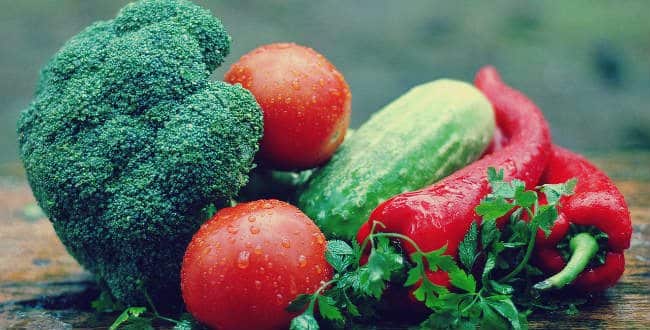
It’s best to eat only healthy products during your intermittent fasting window.
How long your eating window should last ultimately depends on the intermittent fasting protocol you choose. You will learn more about different intermittent protocols further below. Once you get to know all of them, you will be able to choose the one that suits your lifestyle and goals the most.
Let me now tell you a bit more about intermittent fasting, how it works, what its potential benefits are and what drinks you can drink when fasting.
How Does Intermittent Fasting Work? And Why It Works Wonders
When you are fasting, a lot of interesting and desirable processes are taking place in your body. Intermittent fasting is in fact nothing other than a game of hormones.
There are two states in which your body can be. It’s either one or the other:
- Fasting (not eating, voluntarily abstaining from food)
- Eating (feasting, feeding)
Depending on which state you are currently in, different hormones will be at play and different processes will be dominant.
What Is Happening When You Are Fasting (You Will Be Surprised)
If you are fasting, the growth hormone rises, insulin and sugar levels drop and you enter the fat-burning mode. In this mode, you will be using primarily your own fat for fuel. It’s important to note that using your own fat as fuel isn’t detrimental to your health. Nor does it mean you are in the “starvation” mode.
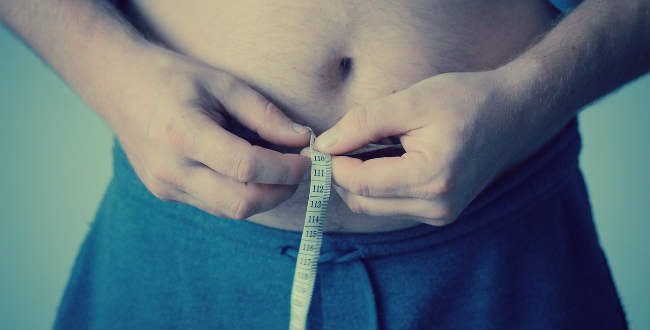
When you are fasting, you are burning fat and using it for fuel.
Fat burning (using your own fat or ketones for fuel) is a very desirable and natural state to be in. This is what you should aim for.
Check the full guide to intermittent fasting hormones to really understand what’s happening within your body when you are fasting. Check the article explaining the fed and fasted states in more detail.
What Is Happening When You Are Eating (You Will Be Astonished)
Insulin is a hormone responsible for lowering blood sugars. After a meal, sugar and then insulin levels rise. If you eat carbs, their levels will simply skyrocket. Once you are in the eating mode, you will be using food energy for fuel. The problems begin when there is too much energy and your body cannot burn it all.
Unfortunately, insulin is not only responsible for lowering blood sugar but also for storing fat. That’s why its second name is the fat-storing hormone.
Once you eat and there is an insulin spike, some amount of immediately available energy gets stored in the liver so that you can easily use it. However, there is a limit to how much energy your liver can store. When the limit is reached, you will start to store this excess energy as fat.
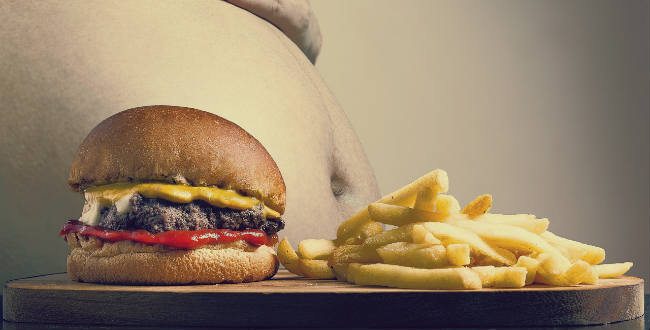
When you are eating, you are in the fat-storing mode.
I guess that’s not what you want to be doing.
Carbs And Insulin Levels (How To Gain Fat Quickly)
Whatever and whenever you eat, there is an insulin spike. However, some foods spike insulin much more than others. You know what I am getting at now, right? Carbs! Foods higher in carbs spike insulin more than low-carb foods. The whole point of a ketogenic diet (and intermittent fasting), therefore, is to keep insulin low.
You remember that in the absence of insulin there is fat burning. That’s why a keto diet is the most effective weight loss tool. On this eating program, you avoid carbs, so your levels of sugar and insulin are low most of the time. If they are low, you are using your own fat for fuel and you lose weight.
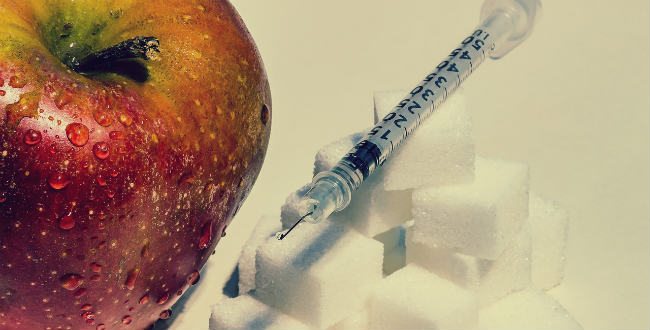
Carbs spike insulin the most. That’s why you should avoid them.
Simple? Absolutely. Effective? Incredibly.
Does Intermittent Fasting Work? Hell Yeah!
First of all, I wouldn’t bother writing almost 13000 words for this page if intermittent fasting didn’t work. It does work and its results are often miraculous. However, you need to remember that intermittent fasting is only a tool and you should treat it as such. It’s a tool to help you achieve your goals and a tool you can easily adjust to your needs.
If you treat it this way, the chances are you are going to be very successful with intermittent fasting. There are really tons of potential benefits of intermittent fasting. If you use it the right way, you can reap most of them. And more!
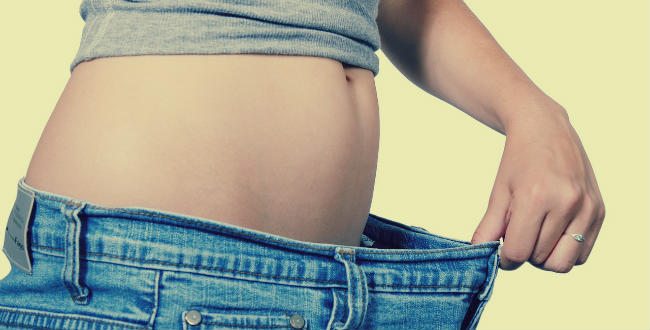
Intermittent fasting works great for weight loss.
Are you still wondering why intermittent fasting works? Why is it more effective than other weight loss programs or tools? Here are a few reasons why:
- The calories-in-calories-out model of weight loss is a bit obsolete. Calories do play a role in weight loss and body composition but they are just one puzzle piece.
- Hormones are much more powerful than calories when it comes to weight loss and fat burning. And intermittent fasting is a tool that influences hormones. Remember insulin the fat-storing hormone? Intermittent fasting keeps insulin low (and so does a keto diet).
- Intermittent fasting is about when you eat rather than about what you it. However, if you combine it with a ketogenic diet, you will become a real fat-burning machine.
Why Intermittent Fasting Works (Better Than Other Diets)
There are tons of reasons why intermittent fasting will become your “discovery of the year” once you give it a try.
I’ve been amazed at the effectiveness of intermittent fasting when I tried it for the first time. I bet you are going to be too.
There probably isn’t a cheaper and more effective eating plan than intermittent fasting. Here are a few top reasons why some people simply fall in love with intermittent fasting:
- RELATIVELY EASY. Intermittent fasting makes it much easier to restrict calories and lose weight. The most popular 16/8 protocol is rather easy to blend into almost any lifestyle and is very effective. Most people doing the 16/8 protocol quickly get rid of any extra weight and can still enjoy the foods they like.
- BUDGET-FRIENDLY. Since intermittent fasting is more about not eating than eating, it’s almost “automatically” more budget-friendly than most diets or eating programs. After all, no one makes money when you are fasting. It’s no wonder you won’t find intermittent fasting ads anywhere.
- BIG MEALS. Intermittent fasting is about reducing the number of hours during which you eat and the number of meals in a day. You can forget about five or six-meals-a-day nonsense and instead enjoy two or three bigger meals after which you will feel full and satisfied for many hours.
- TIME-SAVING. Not only is intermittent fasting budget-friendly, but it also saves you a lot of time. If you eat 2-3 meals (instead of 5-6) a day, you will need less time to prepare food and do the dishes. If you do the most popular program (16/8) and skip breakfast, you can go straight to work or hit the gym once you get up. This means more time for sleep.
- SUITS ANY LIFESTYLE. Everyone would like to enjoy a few free extra hours a day. This is what you usually get once you start intermittent fasting and begin skipping meals. Still want to have a regular breakfast in the morning? No problem. You can skip your supper instead.
- HIGHLY EFFECTIVE. Intermittent fasting influences hormones, such as, insulin, ghrelin, leptin, or growth hormone. The result is less hunger, more fat burning and lean muscle mass gain (if you work out to build muscle).
- BRAIN LOVES IT. You will be surprised at how alert and receptive your brain becomes at the end of your daily fast. You will never experience the popular afternoon “crash” everyone experiences. You won’t need caffeine or any energy drinks to be super alert. You only need intermittent fasting.
Intermittent fasting simplifies life. Period.
What To Drink On The Intermittent Fasting Diet (Without Breaking Your Fast)
The main purpose of fasting is to keep insulin as low as possible for a certain number of hours. You can do that only if you don’t eat anything during this time and drink only certain types of liquids.

The safest drinks to drink during a fast are water, tea and black coffee.
Wondering what drinks are allowed during a fast? The ones that don’t cause any metabolic response and thus don’t break your fast. Which ones are these?
The liquids you can drink freely during a fast include:
- Still and sparkling water
- Water with lemon juice (and mint)
- Tea (black, red, green)
- Yerba Mate (within reason)
- Black coffee (within reason as well)
The (conditional) liquids you can drink if you have problems suppressing hunger include:
- Black coffee with a small amount of good-quality butter or/and coconut oil (a teaspoon)
- Bone broth (if you cannot cook your own you must try Kettle & Fire)
- Zero calorie drinks like Diet Coke or Monster Zero (but be aware that they aren’t very healthy options)
Basically, during a fast you can drink anything as long as it doesn’t have any calories and carbs. Beware of sugary drinks, sports drinks, juices or “fit” drinks with tons of hidden carbs.
Check out the full list of the allowed intermittent fasting drinks and discover more example liquids.
What To Eat On The Intermittent Fasting Diet (And Reap All The Benefits It Offers)
The list of intermittent fasting foods may differ wildly because this eating program is about when you eat rather than about what you eat. However, I can still give you some general guidelines of what products to eat on the intermittent fasting diet:
- Eat foods rich in healthy fats like avocados, fish, coconut oil or eggs.
- Eat foods rich in healthy proteins like eggs (again), fish (again) and fatty meats.
- Make sure to eat low-carb and unprocessed foods. Eat real foods.
- Eat a lot of vegetables (especially raw and fermented). Make sure to eat at least 6-7 cups of veggies every day.
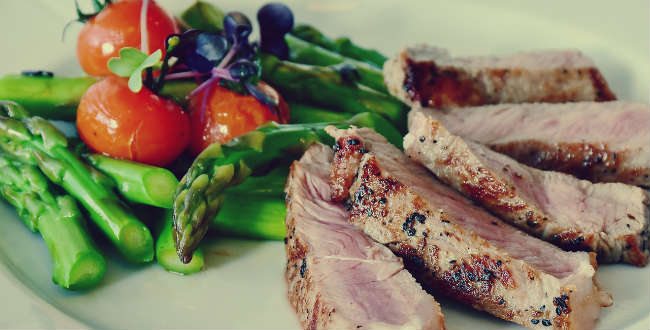
Make sure to eat real and healthy foods on the intermittent fasting diet.
Make sure to read the guide on what to eat on the intermittent fasting diet to get the best health and fitness results.
 Pros & Cons Of Intermittent Fasting… You Must Know These
Pros & Cons Of Intermittent Fasting… You Must Know These
If intermittent fasting weren’t a powerful and almost miraculous tool, I wouldn’t bother devoting the whole twelve-thousand word section to it. However, just like with any program or diet, there are both positive and negative sides.
In this section you will get to know the both sides of the intermittent fasting coin and be able to decide if this tool is right for you. Study this section of the intermittent fasting guide to be sure you aren’t among the few who shouldn’t do this.
Benefits Of Intermittent Fasting (To Name Just A Few)
Even though in-depth and long-term research on IF is lacking, there are some studies pointing to lots of health benefits of intermittent fasting.
There are also thousands of people who have been doing intermittent fasting on their own and who are ready to share their stories with you on their blogs or YouTube. I am one of these people as well.

There are tons health and other benefits of intermittent fasting.
The most common health benefits of intermittent fasting include:
- Weight loss and fat burning. Increased fat burning begins 8-12 hours after a meal. This is usually the time when most people break their fast (i.e. eat their breakfast) and stop fat burning. With intermittent fasting, you get many pure fat-burning hours (depending on the IF protocol you follow).
- Improved cognitive functioning and great alertness of mind. When you are in a fasted state, your brain will be extremely alert. You will have no problems focusing on difficult and demanding tasks at your job or school.
- Lower blood sugar and insulin levels. Intermittent fasting naturally lowers blood sugar and thus insulin (the fat-storing hormone) levels. You don’t need to take any medications to control and regulate these two.
- Reversal of type 2 diabetes. It’s a fact that you can reverse type 2 diabetes with intermittent fasting. With medication you will only be curing symptoms. With intermittent fasting, you will cure the cause and reverse diabetes.
- Autophagy. This is the process of breaking down old or sick cells and using them for energy so that new healthy cells are created. You can induce autophagy only through fasting.
- Reduced inflammation. Inflammation is an immune response of the body. Chronic inflammation obviously leads to chronic diseases. Intermittent fasting reduces inflammation and thus protects you from most chronic diseases like high blood pressure, obesity or diabetes.
- Reduced risk of cancer. Did you know that cancer cells thrive on sugar and insulin? With intermittent fasting, you get a chance to starve cancer cells to death.
- More energy. You will naturally have more energy, need less sleep and your sports endurance will improve. I like to call it being at your peak 24/7.
- Lean muscle mass gain. If lean muscle gain is one of your goals, intermittent fasting will be a great tool to help. The growth hormone (HGH) increases multiple times during a fast, which helps you protect muscle, speed up recovery and gain lean muscle more quickly.
- Hunger control. Leptin is the hormone that lets you feel satisfied after a meal. If it’s out of whack, you will be feeling hungry all the time. Intermittent fasting fixes most issues with leptin.
- Lowering heart attack risk. Intermittent fasting lowers blood pressure and resting heart rate. It also increases the level of “good” HDL cholesterol and decreases the level of triglycerides and “bad” LDL cholesterol. This significantly reduces the risk of having a heart attack or stroke.
Other more down-to-earth benefits of intermittent fasting include:
- Simplicity. Just don’t eat for a certain number of hours and eat for the rest. That’s all.
- Free. Intermittent fasting is totally free. You don’t need to pay anyone to let you do that.
- Convenient and flexible. You can blend intermittent fasting into probably any lifestyle. However, the busiest people will benefit from it probably the most.
- Universal. Whether you are a vegetarian, a vegan or a keto enthusiast, you can do intermittent fasting. Anyone (no matter what their dietary preferences are) can do intermittent fasting.
- Forgives cheat meals/days. Intermittent fasting is probably the most forgiving diet/eating plan of all. Usually one 24-hour fast will undo most of the damage your cheat meal did to you last night.
Got inspired? View the full guide to intermittent fasting benefits.
Possible Side Effects (Make Sure To Read This)
Great and awesome as the intermittent fasting diet is, it’s not drawback-free and isn’t for everyone. Even though there are really few disadvantages of this eating plan, you should be aware of them.
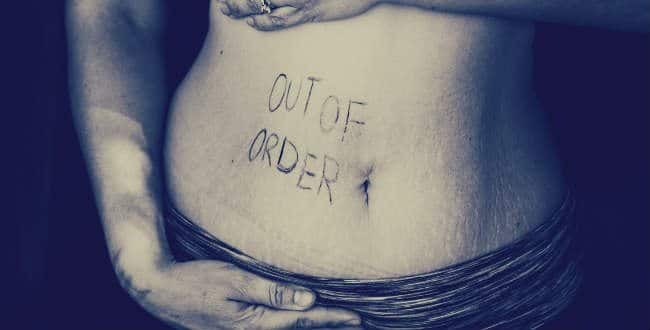
If you eat too much and too quickly after fasting, you will probably get a stomachache.
The most common side effects of intermittent fasting include:
- Stomachache. If you eat your first meal too quickly and eat more than you can handle at one time, you will get a stomachache. This isn’t very serious, but may not be comfortable.
- Intermittent fasting may lead to disordered eating behaviours. You need to be careful with cheating and fasting because these two can result in binging or overeating. If you have a history of binging, don’t do intermittent fasting. A keto diet will be just fine for you.
- Intermittent fasting can mess up female hormones. Even though fasting is generally OK for most women, it can disturb the menstrual cycle of some women. That’s why you need to be very careful with this and start by doing it only on some days of the week.
- Hypoglycemia. Intermittent fasting together with medications lowering blood sugar may lead to hypoglycemia which is a life-threatening condition. This is the warning for diabetics on medications and if you are one of them you have to consult your doctor before you start the program.
Not sure if intermittent fasting is OK for you? Check the full list of cons of intermittent fasting, intermittent fasting side effects or the comparison of intermittent fasting pros and cons.
Who Shouldn’t Do Intermittent Fasting (There Are Exceptions)
Intermittent fasting will be great and highly effective for most people. Most people, however, doesn’t mean everyone. There are a few exceptions and situations where intermittent fasting isn’t the best choice.

Before you start doing the intermittent fasting, make sure you can do this program.
Make sure to consult your doctor before starting IF especially if any of the following applies to you:
- You are diabetic
- You are on prescribed medications
- You are a teenager
- You are pregnant or breastfeeding
- You are underweight
You now know enough about how intermittent fasting works, so it’s now time to show you different intermittent fasting protocols so that you can choose the best one for you.
Types Of Intermittent Fasting Protocols… Probably The Most Exhaustive List On The Internet
There isn’t just one right or best way to do the intermittent fasting diet. You are free to experiment with different intermittent fasting protocols and adjust them to your needs.
Remember that intermittent fasting is only a tool. This tool is supposed to serve you and help you achieve your goals.
Here are the most popular intermittent fasting and fasting protocols. I analyzed these protocols mainly based on their weight loss effectiveness and overall difficulty.
Under each protocol name you will find basic information about its difficulty (on a scale from 1 to 10), weight loss effectiveness (from 1 to 10), people for whom it will be the most beneficial and a few words of description.
12/12
DIFFICULTY: 2/10 (very easy)
EFFECTIVENESS: 2/10 (rather low)
FOR WHOM? Women sensitive to any dietary changes, obese and overweight people addicted to carbs/sugar to help them get started with IF and weight loss, people who want to maintain their current weight rather than lose it and want some control over their eating habits
This is the easiest version of intermittent fasting. On a 12/12 intermittent fasting program, you eat your breakfast in the morning and your last meal around the same hour in the evening.
For example, you eat your breakfast at 9 AM and your supper at 9 PM. You fast from 9 PM till 9 AM the next day.
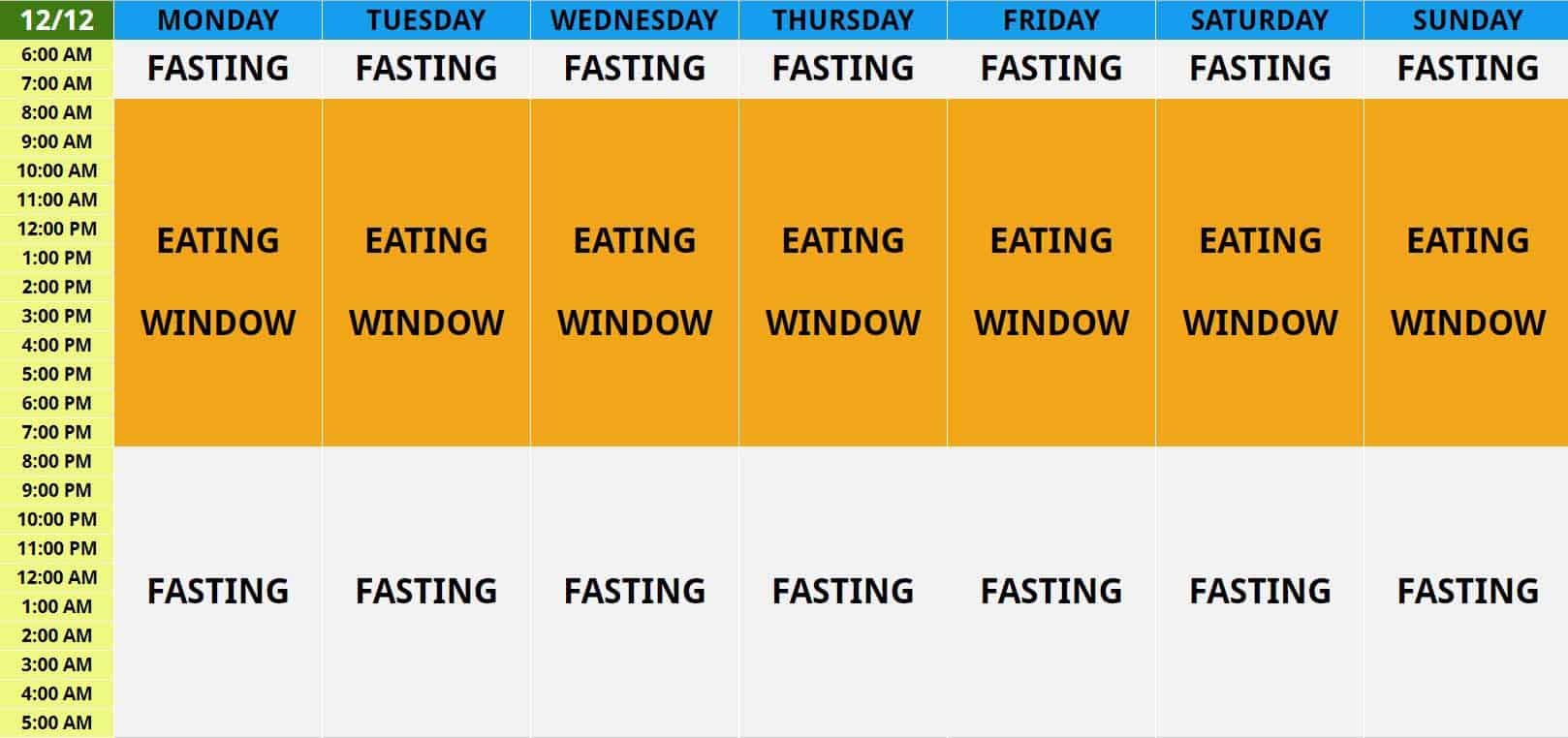
This is an example 12/12 intermittent fasting protocol when you start eating at 8:00 AM and end at 8:00 PM.
12/12 protocol is so easy and natural to follow that many people argue that it’s not really intermittent fasting.
However, if you have a history of overeating, are obese or have hormonal problems (especially women), you can still benefit a lot from daily 12-hour fasts.
14/10
DIFFICULTY: 3/10 (easy)
EFFECTIVENESS: 3/10 (moderate)
FOR WHOM? Women looking for a milder version of IF, obese and overweight people who are starting out with IF and weight loss, people addicted to sugar/carbs, people with insulin resistance, pre-diabetic people
This is a bit lighter version of the most popular 16/8 intermittent fasting protocol. All you need to do to start a 14/10 program is to eat your breakfast a bit later or eat your last meal a bit earlier than usual.
For example, you might eat your breakfast at 10 AM and your last meal at 8 PM. You can also eat your breakfast first thing in the morning (for example at 7 AM) and eat your supper at 5 PM.
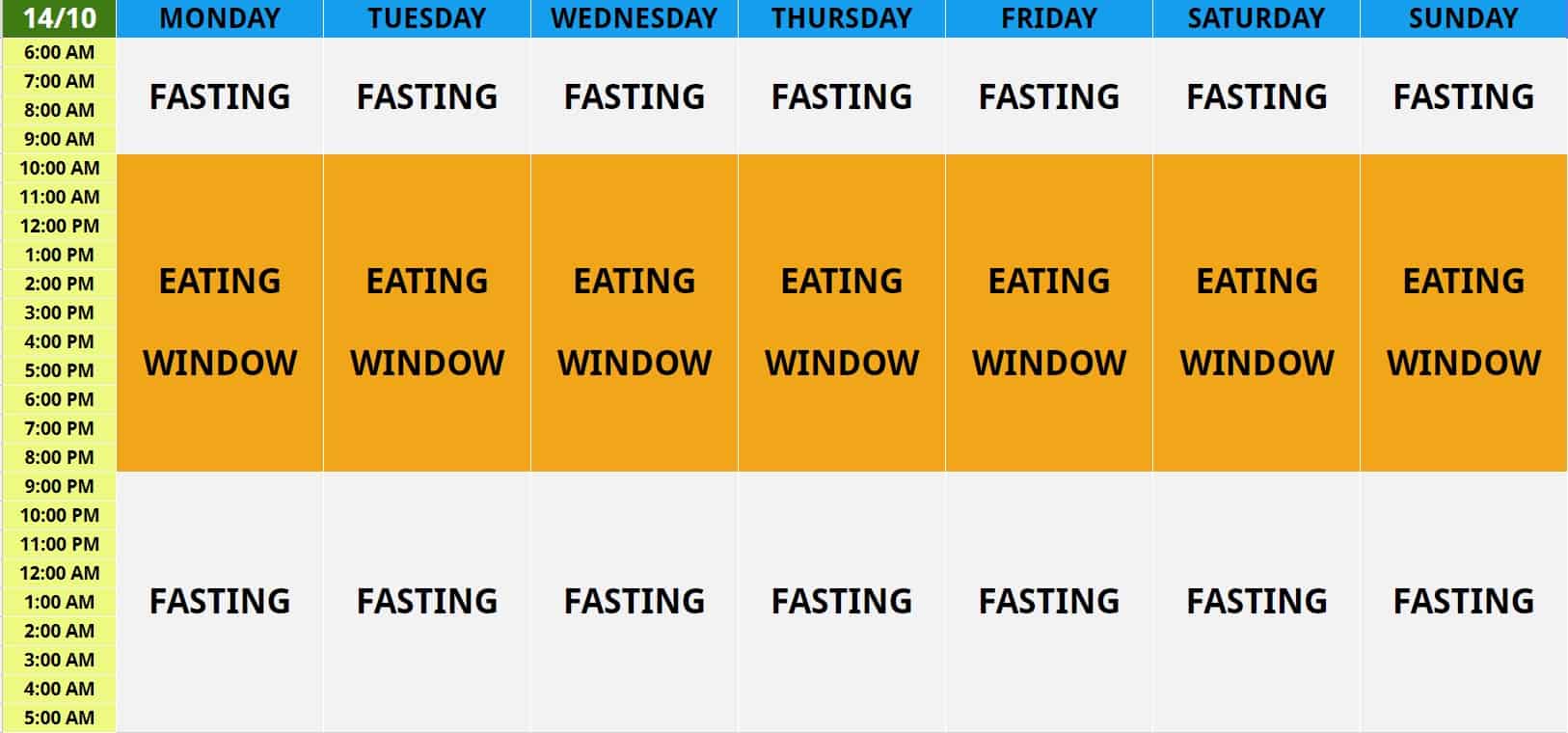
This is an example 14/10 intermittent fasting protocol.
The 14/10 protocol can be highly effective for people who have never done intermittent fasting or any form of fasting.
Most people following a standard American diet usually eat for as long as 15-17 hours and “fast” only during their sleep. If you happen to be one of these people, you will find this protocol very effective (especially in the beginning).
14-hour daily fasts are also a good compromise for women afraid of disturbing their menstrual cycle.
16/8 Intermittent Fasting (Leangains)
DIFFICULTY: 5/10 (relatively easy)
EFFECTIVENESS: 5/10 (rather high)
FOR WHOM? Most people who want to reap the IF benefits and lose weight effectively without going to extremes (i.e. doing longer fasts), athletes who want to get leaner, people who want to lose weight without changing what they eat
This is the most popular intermittent fasting program that has been popularized by Martin Berkhan. Leangains is its another name that comes from the name of the website of its author. This IF protocol is relatively simple to stick to and quite effective.
On a 16/8 intermittent fasting program, you may eat your breakfast at 10 AM and your last meal at 6 PM. If you work out in the evening, you can eat your first meal at 1 PM and finish eating with a post-workout meal at 9 PM.
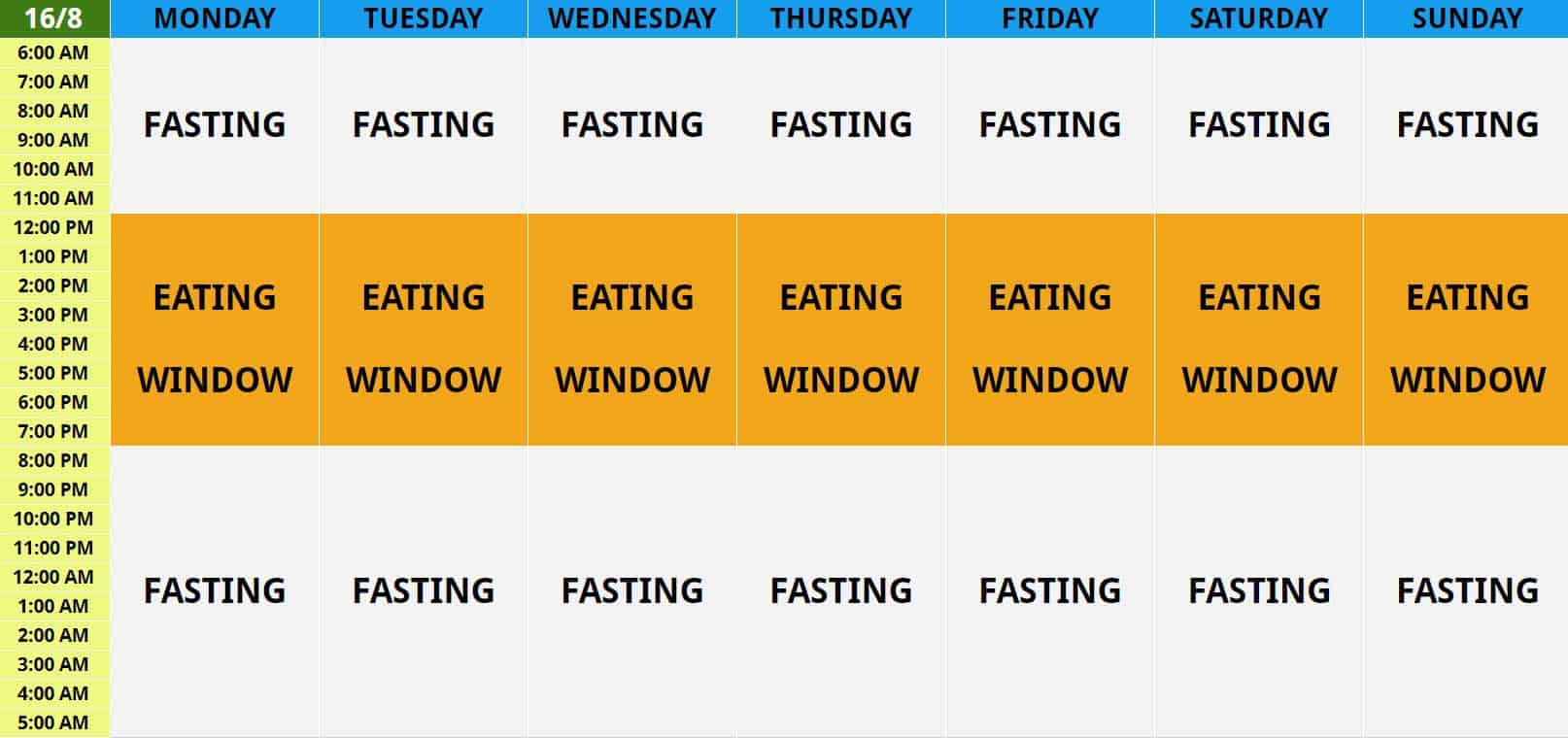
This is the example of the most popular 16/8 intermittent fasting protocol (Leangains).
Most people get all the results they want only by sticking to the 16/8 protocol. In most cases, there is no need to go to extremes.
Interested in the most popular IF protocol? Check the full guide to the 16/8 intermittent fasting protocol. You may also want to check the website of the author of the Leangains method.
18/6
DIFFICULTY: 6/10 (a bit difficult)
EFFECTIVENESS: 6/10 (high)
FOR WHOM? People who want serious weight loss and body composition improvements, mind workers who want to make use of very high alertness in the morning hours, people who have some experience with intermittent fasting or fasting
This is a very effective intermittent fasting protocol that usually leads to quick weight loss and body composition improvements. As your eating window lasts only 6 hours, you usually eat only 2 big meals a day (and a keto coffee) and end up with a caloric deficit.
Most people start to lose weight as early as after a few days of doing 18/6. That’s because they are unable to fill all of their caloric needs in such a short eating window and are completely full after two bigger meals.
If you have never done intermittent fasting, 18-hour daily fasts may be a bit tough at first but they are totally worth the effort.
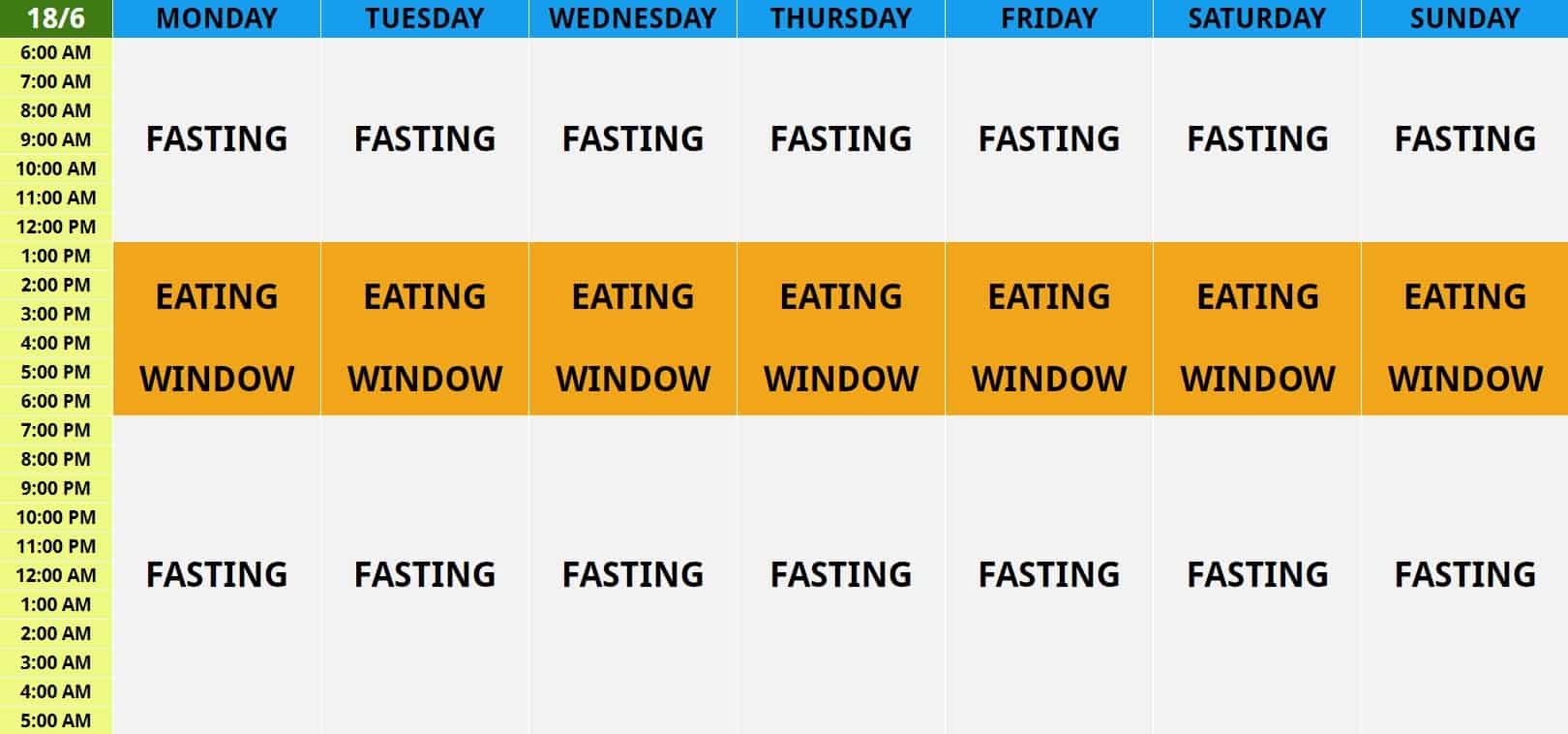
This is how the 18/6 intermittent fasting protocol may look like.
18/6 isn’t a separate intermittent fasting protocol with its own name like some other protocols here. However, I am mentioning it because it’s a nice compromise between the basic 16/8 (Leangains) and advanced (the Warrior Diet) version of intermittent fasting.
20/4 Intermittent Fasting (Warrior Diet)
DIFFICULTY: 7/10 (difficult)
EFFECTIVENESS: 7/10 (very high)
FOR WHOM? Athletes who want to have very low levels of body fat (BF), people wanting to lose a lot of weight, people who like going to bed with a full stomach and fully satisfied, those who prefer eating just one big meal a day, people who have trouble falling asleep with an empty stomach, people who have no problem abstaining from food for a longer time, people who love eating huge meals
This is one of the stricter but highly effective intermittent fasting protocols. It’s been popularized by Ori Hofmekler who called it the Warrior Diet. On this eating plan you are supposed to follow your instinct and eat like an ancient warrior: one big meal later in the day. The only exception is that you are allowed to eat 200-300 calories during your fasting (or underfeeding) phase in the morning.
The Warrior Diet lets you eat any kind of food you like (as long as it’s nutritious and healthy). However, I don’t see the reason why you shouldn’t try to do it together with a ketogenic diet. This may be another very powerful combination.
On an example Warrior Diet day, you eat a small salad in the morning and drink your keto coffee (making sure not to exceed 500 calories). Later in the day, you work out and eat a huge (and highly nutritious) meal soon before going to bed.
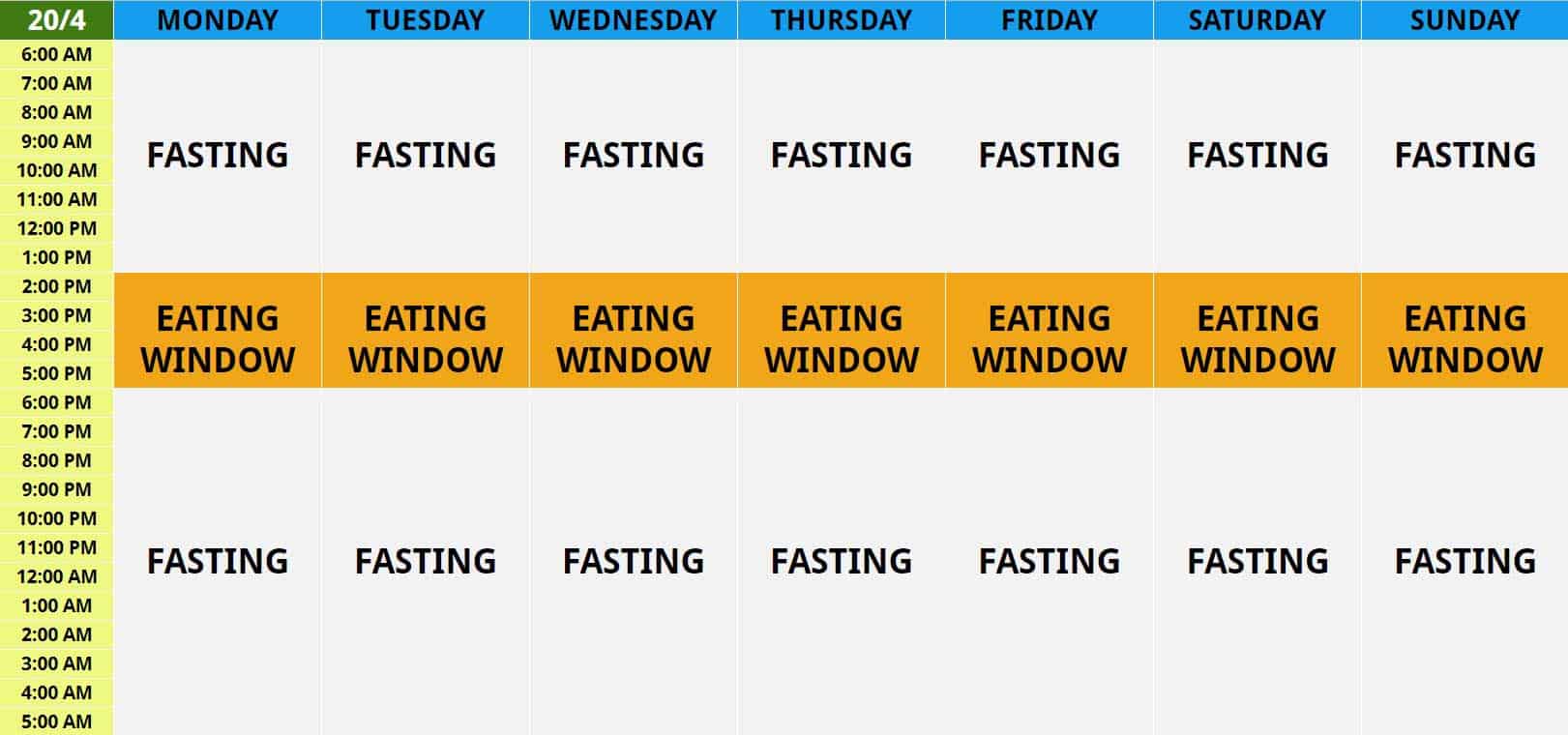
This is how the 20/4 (the Warrior Diet) intermittent fasting protocol may look like.
The Warrior Diet is a good compromise between shorter fasts (up to 16 hours) and prolonged fasting (above 24 hours) as it lets you reap the benefits of both.
Check the full 20/4 intermittent fasting guide and learn more about this highly effective protocol. Here is also the link to the website of the author of the warrior diet.
5:2 Diet
DIFFICULTY: 5/10 (relatively easy)
EFFECTIVENESS: 6/10 (high)
FOR WHOM? People who like eating a lot but who are disciplined enough to say “no” to food from time to time, people wanting to lose weight rather effortlessly, people who want to improve their overall health, people interested in long-term weight loss, people with little experience with intermittent fasting or fasting
On a 5:2 intermittent fasting protocol, you get a bit more freedom with your meals as long as you keep calories under 500 on two days of the week. You are free to eat what you want and how often you want on the remaining days of the week.
For example, on Monday and Thursday you only drink your keto coffee (about 200-300 kcal) and eat a small green salad later in the day (of about 200-300 kcal). On other days, you eat as often and as much as you feel like.
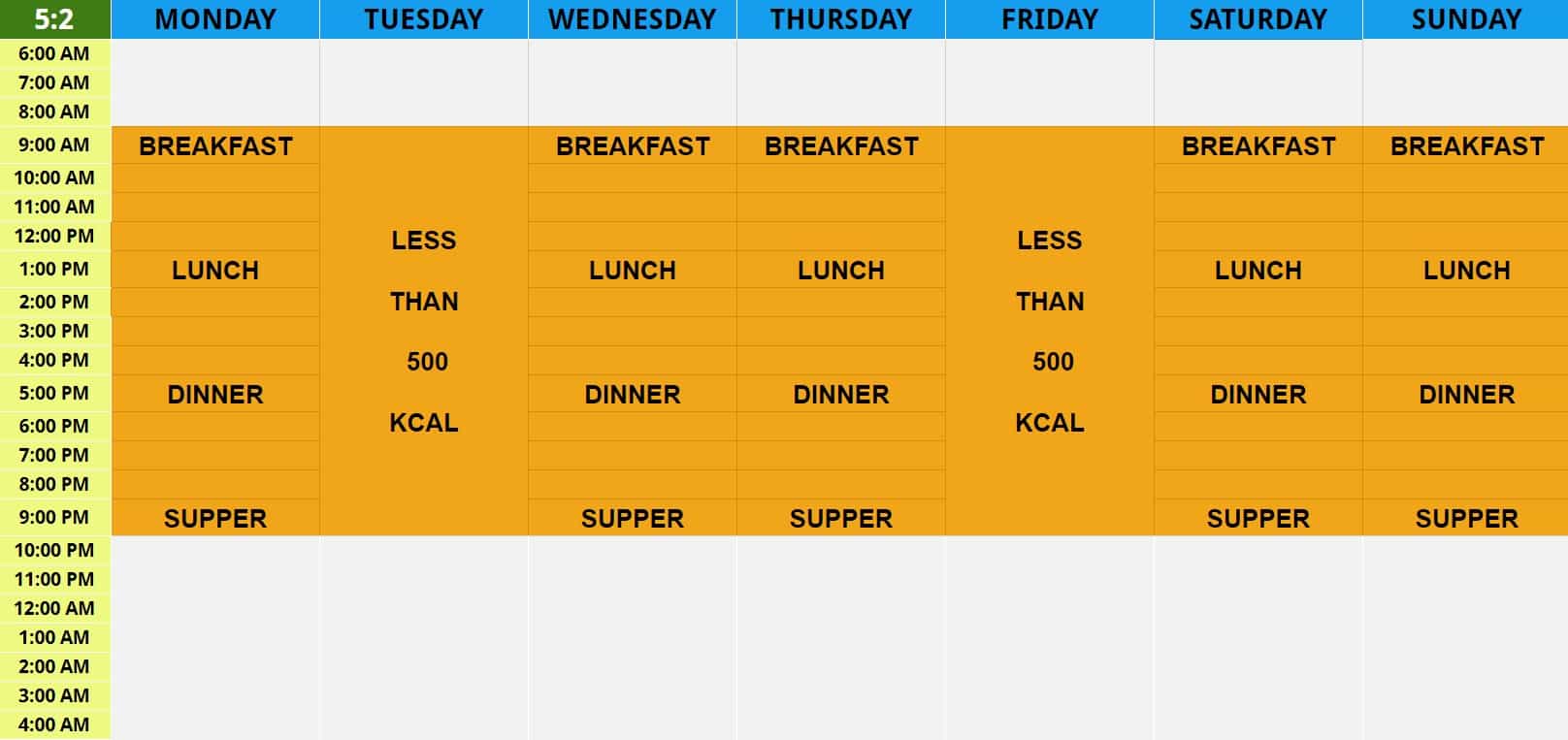
This is how the 5:2 intermittent fasting diet may look like.
This intermittent fasting protocol is one of the most effective protocols for long term weight loss and probably has the best difficulty-to-effectiveness ratio.
If you are interested in learning more about the 5:2 intermittent fasting protocol, check this article out.
Eat Stop Eat
DIFFICULTY: 6/10 (a bit difficult)
EFFECTIVENESS: 6/10 (high)
FOR WHOM? People who like eating a lot but who are disciplined enough to say “no” to food once in a while, people wanting to lose serious weight, people who want to improve their overall health, people with some experience with intermittent fasting
Eat Stop Eat has been popularized by Brad Pilon, a coach and weight-loss guru with experience in the fitness industry. In the Eat-Stop-Eat intermittent fasting protocol, you are allowed to eat any type of food as long as you do one or two 24-hour fasts in a week.
Of course, you cannot go totally overboard and binge 5 times a week as this will create a calorie surplus and the whole point of 24-hour fasts is calorie deficit.
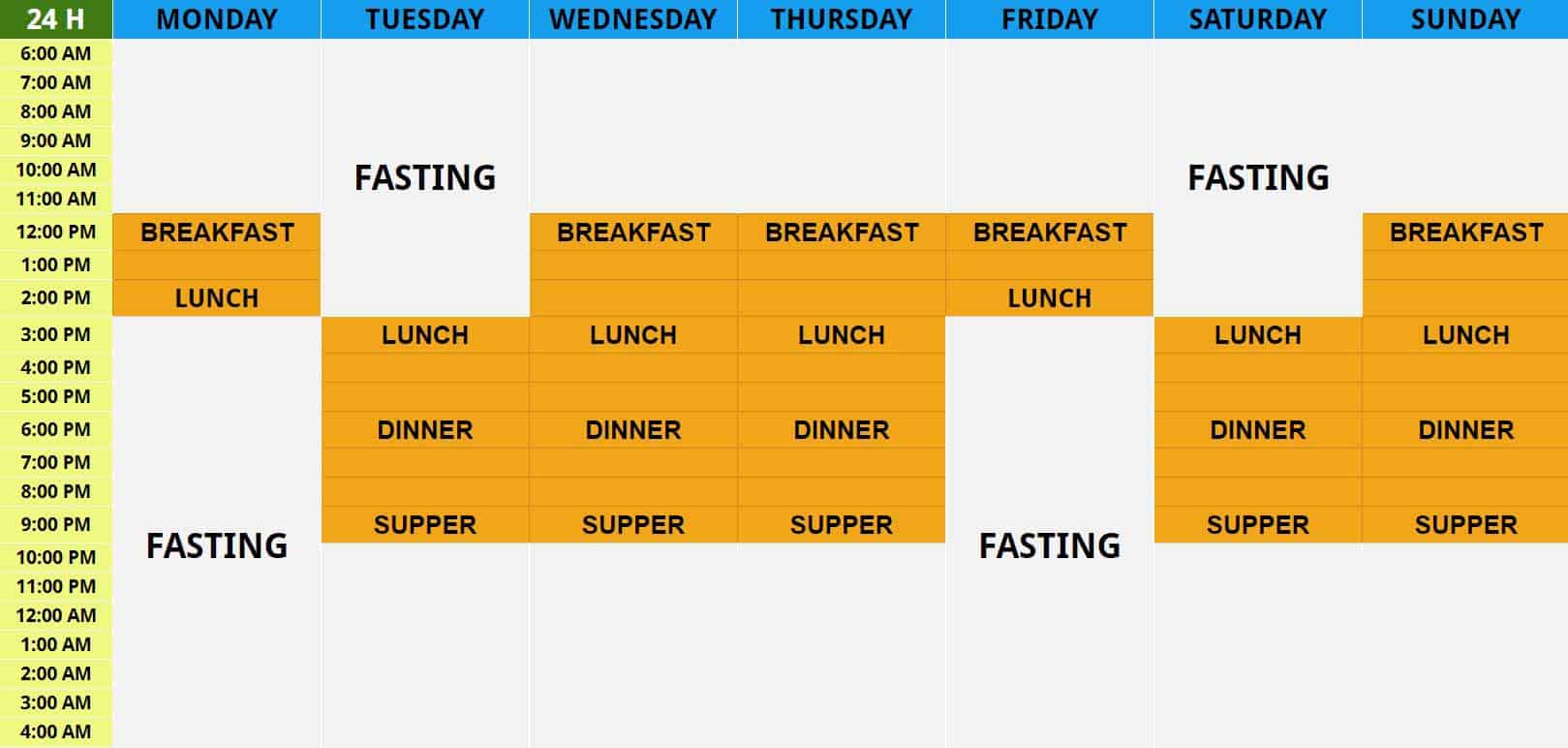
This is how the Eat-Stop-Eat program may look like. It’s simply two 24-h fasts in a week.
Eat Stop Eat is essentially a bit more difficult and more effective version of the 5:2 protocol. The effectiveness of both programs is thanks to a weekly calorie deficit they create.
Alternate-Day Fasting (ADF)
DIFFICULTY: 6/10 (a bit difficult)
EFFECTIVENESS: 7/10 (very high)
FOR WHOM? People who like eating a lot but who are disciplined enough to say “no” to food every other day, people wanting to lose serious weight, people who want to improve their overall health, people who won’t have problems with other people eating nearby (e.g. at work or social meetings)
Alternate-Day Fasting is a bit stricter version of the Eat-Stop-Eat and 5:2 protocols. In the ADF you are supposed to fast every other day. This way you need to restrict what you eat and how you eat only half of the time.
Similarly to the underfeeding period in the Warrior Diet, on the Alternate-Day Fasting program you are allowed to eat about 500 calories on your fasting days, which makes it a bit less difficult to stick to.
For example, you only drink your keto coffee (which has about 200-300 kcal) in the morning and eat a small salad with some protein (200-300 kcal) in the evening on your fasting days. On the remaining days, you eat as much as you feel like.

This is how the Alternate-Day Fasting eating plan may look like.
Even though it’s OK to eat freely on non-fasting days, most people tend not to overeat on the day following a fast. This usually leads to serious weight loss and really great results.
Interested in this protocol? Check the comparison article of alternate-day fasting with intermittent fasting. You may also want to check this article about ADF.
Prolonged Fasts
The longer you fast, the more interesting and desirable processes are happening in your body. If you are healthy and you aren’t a woman planning to get pregnant soon, you may want to give longer fasts a try.
Here are the most common variations of prolonged fasting:
24-Hour Fasts
DIFFICULTY: 7/10 (rather difficult)
EFFECTIVENESS: 7/10 (very high)
FOR WHOM? People already experienced with fasting and aware of fasting benefits, people who want to improve their health, athletes looking for ways to speed up recovery, women not planning to get pregnant soon
A 24-hour fast is more of a one-time tool rather than a protocol. It’s totally up to you how often you do a 24-hour fast. However, if you want to reap all the benefits a full 24-hour fast offers, you should only drink tea and black coffee during this time and do it at least twice a month.
The most often recommendation is to do one 24-hour fast a week to speed up recovery and let your digestive system take a break.
The easiest way to do a 24-hour fast is from lunch to lunch. For example, you eat your lunch at 1 PM and don’t eat anything until 1 PM the next day. You can also do it from breakfast to breakfast or from supper to supper. The version from lunch to lunch seems to be the easiest for most people.

This is how you can add two 24-h fasts in a week.
A 24-hour fast is a proven tool that leads to many health benefits. However, it may be quite difficult to do for people who have never tried fasting. If you are new to fasting, it’s best to start from 14/10 or 16/8 protocols and slowly prolong the fasting period until you reach 24 hours with a relative ease.
36-Hour Fasts
DIFFICULTY: 8/10 (difficult)
EFFECTIVENESS: 8/10 (very high)
FOR WHOM? People already experienced with fasting and aware of fasting benefits, people who want to improve their health, athletes looking for ways to speed up recovery, women not planning to get pregnant soon, people who want to have very low body fat (below average), people with no medical conditions (and not taking medications)
A 36-hour fast is also a tool and it’s not recommended for total intermittent fasting and fasting newbies. This fast is a bit more difficult because it involves one full day of not eating anything (only tea and water are allowed).
You can do a 36-hour fast from supper to breakfast with one full day of not eating anything.
For example, you eat your supper at 8 PM on Monday. On Tuesday, you only drink water, tea and black coffee. On Wednesday, you eat your breakfast at 8 AM. This way you have completed a 36-hour fast.
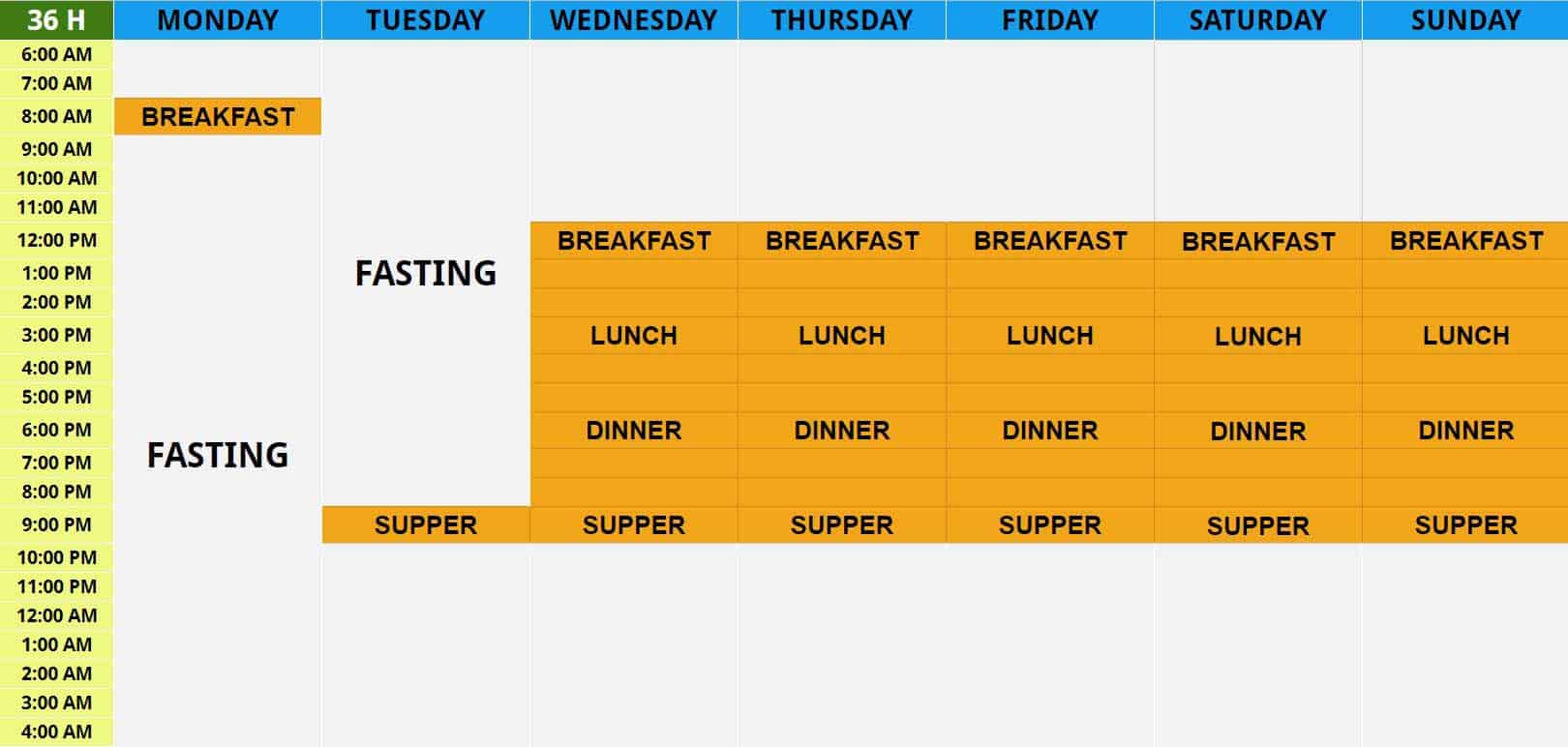
This is the example 36-hour fast done once a week.
Your stomach will seriously shrink after completing a 36-hour fast and you will be likely to undereat on the following days. This will naturally result in weight loss.
48-Hour Fasts
DIFFICULTY: 9/10 (very difficult)
EFFECTIVENESS: 9/10 (very high)
FOR WHOM? People already experienced with fasting and aware of fasting benefits, people who want to improve their health, athletes looking for ways to speed up recovery, women not planning to get pregnant soon, people who want to have very low body fat (below average), people who consulted this idea with their doctor, people with no medical conditions (and not taking any medications)
48-hour fasts generally aren’t recommended more often than once a month. Whether you follow a ketogenic diet or not, you will end up in ketosis after a 48-hour fast. If you aren’t already keto-adapted, you may not feel very well. You might have a headache, feel dizzy or faint. These are the symptoms of the so-called keto flu.
A 48-hour fast has a number of health benefits such as autophagy, detoxification or “resetting” the autoimmune system. If you are a woman, such a long fast may signal that “starvation is coming” and this can disrupt your menstrual cycle.
The easiest way to do a 48-hour fast is from lunch to lunch. For example, you eat lunch at 1 PM on Monday and you don’t eat anything until lunch at 1 PM on Wednesday.
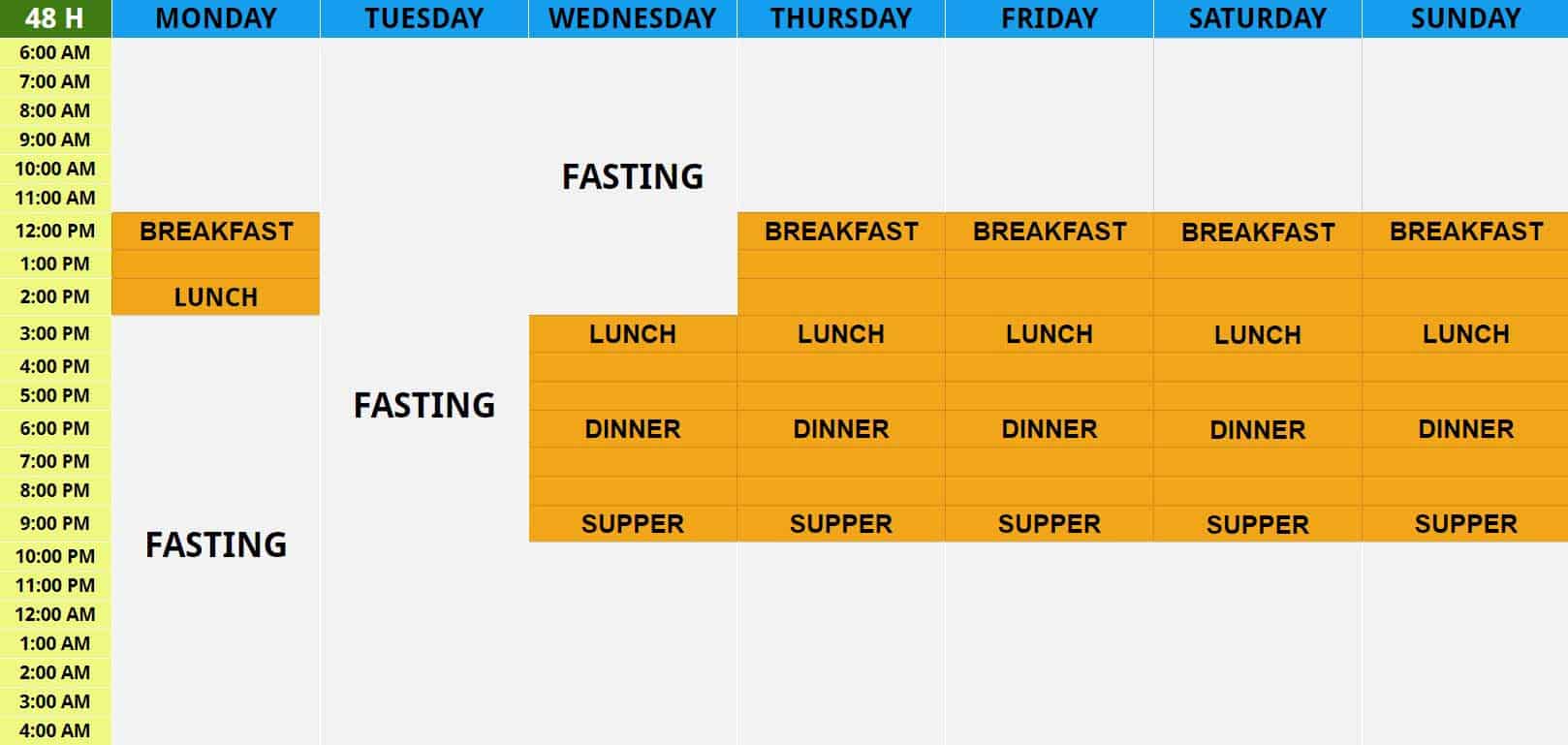
This is how you can blend a 48-hour fast into your week.
No matter what you’ve eaten before, you are going to experience nice weight loss after 48-hour fast. Make sure not to overeat at your first meal because you will get a horrible stomachache. You stomach will be super sensitive and shrunk after such a long fast.
Longer Fasts
DIFFICULTY: 10/10 (very difficult)
EFFECTIVENESS: 10/10 (very high)
FOR WHOM? People experienced with intermittent fasting and fasting, people who know why they want to do a longer fast, people with no medical conditions (and not taking any prescribed medications), women not planning to get pregnant in the months to come, people mostly wanting to improve their health and speed up recovery
Any fast that is longer than 48 hours is usually considered a prolonged fast. Longer fasts have lots of great health benefits and can sometimes even do miracles. Unfortunately, they also involve a lot of risk and aren’t recommended for everyone.
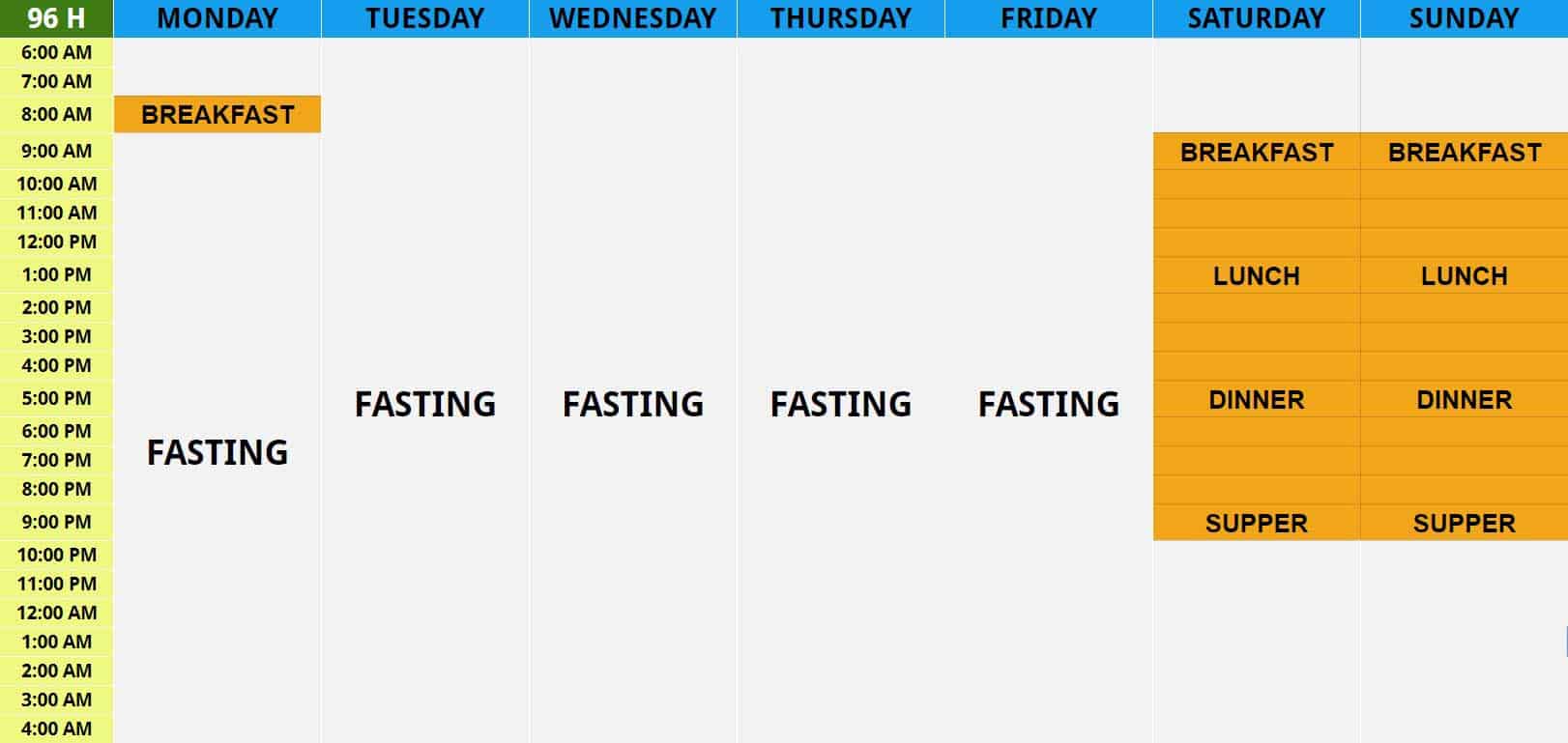
This is how a 96-hour fast may look assuming you want to start on Monday.
The general rule with fasting is that the longer the fast, the more effective it is, the more difficult it becomes and the riskier it gets. There is a thin line between great effectiveness and a great danger, so you need to be careful.
There are really hundreds of ways you can practice prolonged fasting. For example, you might eat normally on a day to day basis but do a 7-day fast quarterly. The key is to choose the way and method that serves your goals best and doesn’t put you at risk.
The purpose of prolonged fasting is most often health improvement rather than weight loss. If you want body composition improvements and increased fat burning, you will be better off doing regular workouts and regular intermittent fasting. If you do a longer fast, you will probably not be able to do intensive workouts during this time. That’s why longer fasts are best for recovery and regeneration.
Fasting is a really fascinating topic, so I recommend you read more about fasting here (Wikipedia link) and in this article about the history of fasting.
 Intermittent Fasting Knowledge Base… To Become The Real IF Master
Intermittent Fasting Knowledge Base… To Become The Real IF Master
As you can see there are tons of ways in which you can do intermittent fasting. It’s not only about when you eat (even though it’s the main variable in this program) but also about what you eat, who you are (man, woman, athlete or non-athlete) and what your goals are.
The list of variables and factors can go on and on. These are all different aspects that will make your intermittent fasting version absolutely unique and tailored to your needs. You already know a lot, so let’s now make you a real IF master and talk about a few other topics related to intermittent fasting.
Intermittent Fasting And Ketosis (And How The Two Work Together)
It is not necessary to do both intermittent fasting and a ketogenic diet. You can do either one or the other and still get great results. However, when done together, they are a really powerful combination.
What this means is that you can get more out of intermittent fasting if you do it with a ketogenic diet and you can get more of a ketogenic diet if you combine it with intermittent fasting.
Here are a few simple facts about intermittent fasting and ketosis:
- Enhanced fat burning. The whole point of intermittent fasting is to lower insulin, the fat-storing hormone. So is the point of a keto diet! If you combine the two, you can almost double the fat-burning effect, because you will have low insulin levels almost all day long. Know what it means? You will be burning fat all day long.
- Deeper ketosis. Do you know what’s the quickest way to get (back) into ketosis? Stop eating for about 48 hours. If you combine a ketogenic diet with daily fasts (even shorter ones like 14 or 16 hours), you will increase your blood ketone levels and be in deeper ketosis. If you accidentally kick yourself out of ketosis, you will be much quicker to come back if you do intermittent fasting.
- Less hunger. Both intermittent fasting and a ketogenic diet have a positive effect on ghrelin (the hunger hormone) and make you feel less hungry. If you combine them, you might entirely stop feeling hungry and even have problems eating the required amount of daily calories. Do you know what it means? Great weight loss and reduced need to cheat.
Read the full intermittent fasting keto guide and learn how to combine these two most powerful health tools. If you want to know the differences, check the comparison article (intermittent fasting vs keto).
Intermittent Fasting For Weight Loss (The Most Common Use)
Let’s be honest. Most people do intermittent fasting either to lose extra weight or improve their body composition (and become very lean). Few people do intermittent fasting for the health benefits it offers. Health improvement is usually “only” a nice bonus to your new and sexy body.
So many people choose intermittent fasting as their weight loss tool because it’s highly effective… and highly forgiving. If you do one of its stricter versions (18/6, the Warrior Diet or Alternate-Day Fasting, for example), you can have a big surplus of calories in one day, cheat from time to time and still lose weight.
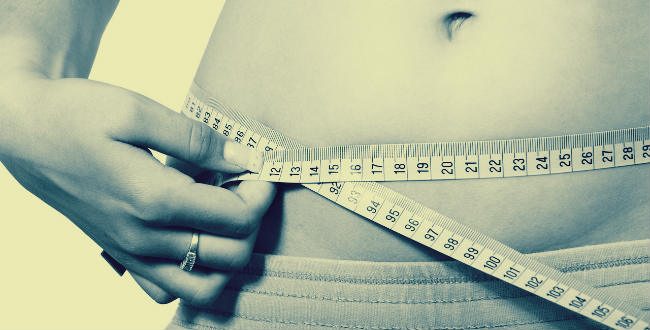
Intermittent fasting is one of the most effective weight loss tools.
Which diet will let you do that? No diet can do that and that’s the miracle of intermittent fasting. However, as you can see, this is a very powerful tool and you need to treat it as such because its power may turn against you.
Check out the full guide to intermittent fasting for weight loss and avoid making the most common mistakes to achieve maximum weight loss.
Intermittent Fasting And Calorie Restriction (Powerful But Risky)
The biggest advantage of intermittent fasting is that it lets you lose weight without restricting calories. All you need to do is change when you eat rather than what you eat. As long as you eat only within a few hours of your eating window, you will be effectively burning fat in your fasting time.
If you combine intermittent fasting with caloric restriction, you will be up to very serious weight loss. This is another quite powerful combination, but you need to be very careful with it and don’t go overboard.

It’s not absolutely necessary to restrict calories on the intermittent fasting diet.
Doing both intermittent fasting and caloric restriction isn’t necessary for most people. Fasting is a stress factor and so is caloric restriction. And your purpose is not to put your body under too much stress.
If your body is under too much stress, the stress hormone (cortisol) will skyrocket and it may stop your weight loss. That’s not what you want, right?
Not sure if you should restrict calories on this eating plan? Discover the full guide on intermittent fasting and calorie restriction to decide if this combination is compliant with your goals.
Intermittent Fasting For Women (Women Need To Know This)
Everyone is talking about intermittent fasting and men. The few studies available on IF almost all relate to men, not women. When you are reading about great health benefits of intermittent fasting, you are probably reading about the results men got. I am sorry.
Bot how about women? How do they react to intermittent fasting? Should they do it? Let’s find this out.
If you are a woman, take your time to study this section and learn more about intermittent fasting and women. I am a woman myself, I do intermittent fasting and I’ve been studying this subject very thoroughly for a long time.
The most important takeaway is that women can do intermittent fasting and many of them do it for reasons other than weight loss. The best example are women who fast for religious purposes like Muslim, Buddhist or Catholic women.
If you are a woman looking for an effective weight-loss tool, you should definitely give intermittent fasting a try. However, you need to be careful and use this tool intelligently because it does affect women differently than men.
Here are a few important points and facts for women interested in intermittent fasting:
- Women all over the world fast and have fasted for thousands of years.
- Women may respond differently to intermittent fasting than men though most have similar weight loss results.
- Intermittent fasting may disrupt your menstrual cycle and in some cases even end up in amenorrhea.
- Women with a very low body fat percentage (under 10%) or underweight (BMI under 19) shouldn’t fast.
- You can do intermittent fasting every other day to both reap its benefits and lower risks.
Make sure to read the full guide on intermittent fasting for women to discover more facts and tips especially for women. I also recommend you read this article about women and fasting.
Intermittent Fasting For Athletes (Very Common & Great Choice)
Intermittent fasting is also a brilliant tool for athletes who want to get very lean, speed up recovery and improve their sports endurance. If you are an athlete, you should give intermittent fasting a try and the results may amaze you.
Wondering why intermittent fasting is good for athletes? Here are the top reasons:
- Extremely effective fat burning when working out in a fasted state
- Increased and quicker recovery (this means fewer injuries)
- Lean mass gain if you work out to build muscle
- Increased performance (once you become keto adapted)
Check out the full guide on intermittent fasting for athletes and discover more tips and tricks to let intermittent fasting help you achieve all your sports goals.
 Intermittent Fasting Tips… You Cannot Miss
Intermittent Fasting Tips… You Cannot Miss
I’ve analyzed the most popular intermittent fasting concerns and mistakes I see among my website visitors and other people doing this program. And here is my compilation of the best and the most useful tips for people interested in intermittent fasting or already doing this program.
You are one step closer to knowing all the ins and outs of intermittent fasting. 🙂
Below you will find the basic lidrinst of the most important tips. If you want to learn more, make sure to study the full list of the most important intermittent fasting tips.
Intermittent Fasting When Sick (Whether It’s A Good Or A Bad Idea)
Caught a cold and unsure if doing intermittent fasting is a good idea? Or you are simply feeling sick and want to know if you should still fast?
There are conflicting theories on doing intermittent fasting when you are sick. Whether it’s a good idea or not ultimately depends on your context and how sick you are.

It’s up to you to decide if you want to do intermittent fasting when you are sick.
Here are a few general rules.
It is rather OK to do intermittent fasting if:
- you only have a mild cold and besides that function rather normally
- you are not taking any prescribed medications
- your energy levels and sports endurance haven’t really been affected
It is rather NOT OK to do intermittent fasting if:
- you have a high fever
- you are really sick and feel very hungry
- you are taking prescribed medications (e.g. painkillers)
Fasting is a natural body reaction to viruses or infections. You probably noticed that you are rarely hungry when you are sick. That’s because your body wants to focus on recovery and fighting the infection, not digesting food. On the other hand, when you are sick and out of energy, your body may crave nutritious meals, vitamins and micro-elements.
A good compromise may be to simply do a milder version of intermittent fasting when you are feeling sick. Instead of your usually, say, 18 hours, you can do only 14-15 hours. It is your task ultimately to observe how you feel and choose what you feel will be the best for you at the moment.
Intermittent Fasting And Exercise (Athletes Should Do IF)
It’s one of the greatest myths that you shouldn’t work out on an empty stomach because you will burn your muscle and enter the starvation mode. Of course, if you aren’t adapted to working out in a fasted state, you will have less energy and lower performance. However, if weight loss and body composition are your goals, you really want to do intermittent fasting and exercise during your fast.
When you begin a work out, you usually have a supply of about 2000 kcal in muscles and at least 20 000 kcal in your fat cells before you start to break down muscle. That’s pretty much, isn’t it? Is there a good reason why you shouldn’t want to tap into your fat reserves for energy?

Intermittent fasting and exercise go well hand in hand.
If you work out in a fasted state (8-14 hours after your last meal), you will use most of these calories from fat and get leaner. Why should you miss such a great opportunity? Well, you should not.
Wondering if you want to combine intermittent fasting with exercise? Check out both points. Read the guide on intermittent fasting and exercise. Next, check the article on doing intermittent fasting without exercise and decide what’s best for you.
First Meal After Intermittent Fasting (Your Most Important Meal)
If you have reached so far, you probably don’t believe in the breakfast-is-the-most-important-meal nonsense. Yes, you can and you even should skip breakfast.
The fact that you can skip breakfast doesn’t mean, however, that you shouldn’t pay special attention to your first meal. After a longer fast, your stomach may be super sensitive and shrunk. That’s why you have to be very careful with it.
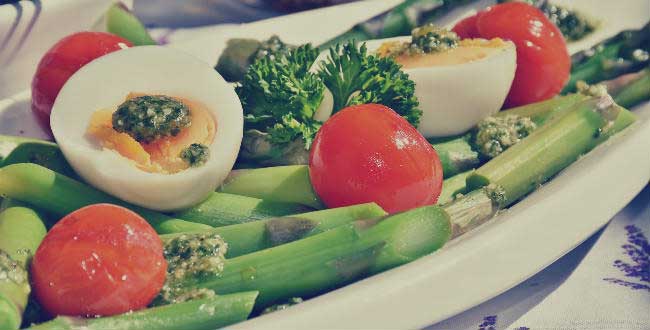
The first meal you eat after fasting is the most important one.
Here are the top rules for the first meal of intermittent fasting:
- A moderate amount of protein (not more than 30-40 g)
- A moderate size or you will have a serious stomachache (I know what I am talking about)
- A serving of vegetables to provide necessary nutrients and fiber
- A moderate portion of fat (40-50 g) depending on your macros and goal (less if you want to lose weight)
- Eat it slowly and chew every bite several times (if you have enough self-control)
Note that some intermittent fasting and fasting regimes assume eating just one meal a day. Check the article on doing intermittent fasting with one meal a day.
Intermittent Fasting Times (Timing Still Matters)
You have already discovered different intermittent fasting protocols. You can choose the one that suits your lifestyle and goals the most.
However, based on information from lots of people and research available, it turns out that for specific people specific intermittent fasting times give the best results. This is the case with athletes, women and obese or overweight people.

Make sure to choose the intermittent fasting times that suit your lifestyle the most.
Below I am giving the most optimal intermittent fasting times for these three groups of people following the most popular 16/8 intermittent fasting protocol.
- Athletes who work out in the evening may want to put off their first meal until a bit later (1-2 PM) and eat their last meal after a workout (even at 9-10 PM) to lower post-workout cortisol and sleep well. If you want to burn as much fat as possible, you may want to work out early in the morning and eat your first meal 4-5 hours after your workout.
- Women who want to take it easy may start with a keto coffee first thing in the morning, eat their breakfast at 9 AM and the last meal at around 6 PM.
- Obese or overweight people will respond to intermittent fasting very well, so they can start with an easier plan of 14-hour fast and 10-hour eating window. The first meal may be at 9 AM and the last one at 7 PM.
Intermittent fasting is mostly about timing. However, there are a few other rules to obey as well. Check the full list of intermittent fasting rules.
What You Need To Know About Hunger (And How To Fight It)
The most important thing you need to know is that hunger comes in waves and pangs. If you ignore it, it will simply go away after some time. What’s more, hunger doesn’t increase proportionately to the time that has passed. You will usually feel the most hungry somewhere in the middle of your fasting window (not at its end).
Intermittent fasting will let you reevaluate your relationship with food and perceive hunger differently. You will realize that hunger in most cases exists only in your head. You won’t understand what I am saying unless you experience it yourself.

One of the purposes of intermittent fasting is to learn to control hunger and know when it’s real.
My major observations regarding intermittent fasting and hunger based on my own experience and research include:
- Real hunger begins after more than 10 days of fasting. Some even say it really begins only after a few weeks.
- After about 24-26 hours of fasting people usually stop feeling hungry. I can confirm that!
- You can easily suppress hunger if you drink a lot of water, hot tea or black coffee. From my own experience, carbonated water and Yerba Mate work the best.
- Most people often eat out of boredom (or habit), not hunger. Don’t do that!
- If you work out a lot, you may feel hunger more intensely on your workout days and have trouble suppressing it. In that case it’s better to apply a lighter version of IF on a workout day (for example, only 14 hours of fasting) or consume a bit more calories (even slightly above your daily needs).
- If you exaggerate with suppressing your hunger, fast for too long and work out too intensively, you might binge once you start eating. Been there and done that, so be careful with that one either.
Take a look at the full guide to intermittent fasting hunger and fight it the right way.
Alcohol (Good News)
As you know, intermittent fasting is about when you eat rather than what you eat (or drink). The best recommendation on intermittent fasting and alcohol is similar to the one I give to people on a ketogenic diet.

You can drink alcohol and do intermittent fasting but do you really need to?
You simply need to remember a few below facts and decide if you need alcohol on the intermittent fasting program. Here is what you need to take into account:
- No matter how disciplined you are in your heart, you are very likely to binge on sweets, fast foods and other carbs if you are under influence.
- The moment you drink alcohol, your liver starts to prioritize it and any fat-burning process stops. If you eat fat or carbs while drinking alcohol, you will be storing any excess energy directly as fat.
- Most alcoholic drinks are high in sugar and carbs, so they they will only help you store more fat.
- If you drink too much alcohol, you will kick yourself out of ketosis (at least until your liver finishes metabolizing alcohol) and stop any efficient fat burning.
- If you combine drinking alcohol with binging on carbs, you will need more than a week to get back to ketosis and effective fat-burning.
In the guide on intermittent fasting and alcohol, you will discover even more tips and tricks on how to drink alcohol and still stay on track.
Coffee (Great News)
Can you drink coffee while intermittent fasting? Absolutely. Great news for coffee addicts. You can and you even should drink coffee if you do intermittent fasting (or follow a keto diet).

You can drink back coffee during fasting. It will only help you burn fat more effectively.
Unless you really go overboard with the amount (and drink like 5 cups of coffee a day), coffee will help you achieve your goals. Here is why it’s a good idea to do intermittent fasting and drink coffee:
- Coffee will help you burn more fat
- Coffee will help you produce more ketones and get into ketosis more quickly
- Coffee will help you suppress hunger
- Coffee will help you do a more effective workout
Coffee can do all of these wonderful things and even more as long as you don’t put sugar into it or tons of artificial sweeteners. If you don’t do that, you are good to go.
Check out the guide to the most powerful intermittent fasting coffee. Try my keto coffee recipes as well.
BCAA (Athletes, Attention)
Branched chain amino acids are very important three acids, such as, leucine, isoleucine and valine. They promote muscle growth and may help fight muscle fatigue. BCAAs are most beneficial for athletes interested in muscle growth and protection.

If you are an athlete, you may want to supplement BCAA during your feeding window.
The natural sources of BCAAs include mainly eggs and meat. People eating a lot of protein on a daily basis (more than 1-1.5 g per kilogram of body weight) don’t need to supplement BCAAs.
But how is it with intermittent fasting? Should you take more, less or no BCAA if you do intermittent fasting? As always it depends on your goals and your context but if you are active I usually recommend taking BCAAs.
Check the full guide to BCAA and intermittent fasting to learn all the necessary tips on taking this supplement and decide if you need it.
Cheating (Won’t Break Your IF Routine)
What would any diet be worth if it didn’t allow any cheat days or cheat meals? Not much. Would you be able to stick to such a program for a long time or for the rest of your life? Very unlikely.

Intermittent fasting forgives cheat meals better than any other eating program.
Fortunately, intermittent fasting and cheat days are not mutually exclusive. All you need to do is combine them intelligently and obey a few rules. Cheating and cheat days are OK as long as they don’t make you take a few steps back or hinder your progress for a couple of days.
Remember that both intermittent fasting and cheat days (or meals) are tools to help you achieve your fitness and health goals. And I am here to l teach you how to use them to your advantage.
Check out the full tutorial of intermittent fasting cheat days to learn how to cheat and avoid the most common mistakes.
Intermittent Fasting Apps (That Will Help You Do It Better)
I cannot imagine tracking my intermittent fasting without a good intermittent fasting app. Not only does the app show exactly how long you’ve been fasting but it often gives you tons of interesting stats. With a good app, you will feel more motivated to stick to your IF plan.
However, as always there is another side of the coin and you cannot let the app totally control your eating routine and start counting minutes (or even seconds) to your meal. The fasting app is supposed to help you, not imprison you.
There are quite a few intermittent fasting apps and my favorite one is FASTRAC (Android app).
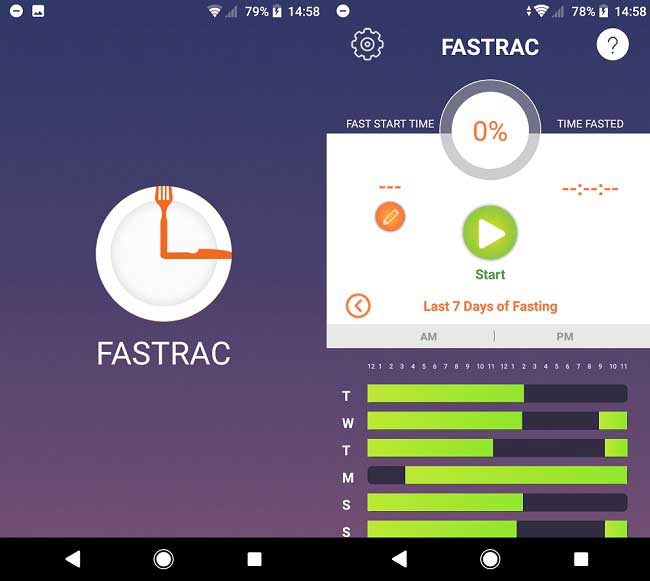
This is my favorite intermittent fasting app (FASTRAC).
Check out the review of the best intermittent fasting apps and choose the one that suits you the most.
Top Intermittent Fasting Mistakes (You Need To Avoid)
When it comes to the art of intermittent fasting, you can either learn from your own mistakes (more painful) or from the mistakes of others (not painful).

Make sure not to commit one of the most common intermittent fasting mistakes.
Here are the top five most common intermittent fasting mistakes. Have you been avoiding all of them?
- Breaking the fast with a huge meal that gives you a stomachache and makes you (almost) fall asleep.
- Drinking liquids that aren’t allowed and thus breaking your fast unintentionally.
- Making your eating window too short and thus putting unnecessary stress on your digestive system.
- Not knowing how to cheat and thus destroying your progress.
- Doing intermittent fasting for many days in a row (if you are a woman) and thus messing up your hormones.
Be careful with these mistakes because they can entirely stop your progress for weeks or even make you take a few steps back.
Read the full guide with more examples and tips on how to avoid the top intermittent fasting mistakes.
Common Intermittent Fasting Myths (Let’s Bust Them)
There are really tons of less and more stupid intermittent fasting myths you need to be aware and beware of. Most of them come from ignorant people too afraid of opening their minds to something new (and better). The great news is that you aren’t one of them.

Don’t believe in all these intermittent fasting myths and don’t let them get you out of track.
Here are the top intermittent fasting myths you will hear and read about almost everywhere:
- Breakfast is the most important meal of the day.
- You need to eat six meals a day to speed up your metabolism (or not to let it slow down).
- Weight loss or weight gain is only about how many calories you eat versus how many you burn.
- Not eating for a couple of hours will put you into the starvation mode and make you gain fat.
And the most important fact (not a myth) is that no one makes money when you aren’t eating. When you are fasting, you are the only person who benefits from it (you improve your health, burn fat, save money and time).
If you want to learn more, check out the full guide on intermittent fasting myths where I am busting each and every myth.
Intermittent Fasting FAQ… The Essential Questions & Answers
When talking to my website visitors or clients, I’ve noticed that some questions or patters like appear more often than others. There are also a few questions that everyone new to intermittent fasting always asks.
Here is the full list of the most popular intermittent fasting questions together with my simple and to-the-point answers. Have a nice read, the brand-new intermittent fasting master. 🙂
Feel free to study the below list of the most frequently asked questions about intermittent fasting or share it with your friends interested in doing intermittent fasting. Good knowledge is power so help me spread it.
Is Intermittent Fasting Healthy?

Intermittent fasting is nothing other than a bit lighter version of fasting. I probably don’t need to tell you that the wonderful health benefits of fasting have been known for ages.
A quite recent medical recovery of autophagy (our body simply “recycling” old and sick cells to replace them with new and healthy ones) and the fact that intermittent fasting triggers it speak for themselves.
Learn more about autophagy (click here) and other great benefits of intermittent fasting.
Can You Drink Coffee While Intermittent Fasting?

Black coffee is totally OK during intermittent fasting because it doesn’t break a fast. However, remember that you cannot put sugar, cream or any fat into it. And also beware of types of coffee served at restaurants. They are usually full of sugar or lactose (milk sugar).
Caffe Latte (that has tons of milk and usually sugar) is the best example of a forbidden type of coffee.
Learn more and discover other intermittent fasting drinks.
What Can You Drink During Intermittent Fasting?
There are different types of fasts and some of them allow certain drinks while others (especially the religious or spiritual fasts) don’t even let you drink anything (we call them dry fasts).
Fortunately, the intermittent fasting version we are talking about here isn’t as strict and there are quite a few different beverages you are allowed to have rather freely.
The rule of thumb is that you can have a given drink as long as it doesn’t have any calories in it. The top intermittent fasting drinks include water, different types of tea and black coffee.
When it comes to diet sodas or other diet zero-calorie drinks, it’s up to you to decide if that drink is OK. Generally these drinks aren’t recommended even though they are “technically” OK.
Here is the full list of intermittent fasting drinks.
How Much Weight Can You Lose With Intermittent Fasting?
That depends on your starting point, age, activity level and quality of foods you are consuming. However, you can expect to lose 1-2 pounds a week on average (that’s what most folks get).
The more weight you have to lose, the more pounds you will be losing initially. You must also know that everyone sooner or later hits the weight loss plateau and you will hit that too.
Be prepared for weight loss stall and don’t get frustrated when it comes. You just have to be patient and not get off track because you will come back to losing weight after a few weeks at the latest.
If you wan to really speed up your weight loss process, combine intermittent fasting with a ketogenic diet and restrict calories (but don’t go overboard).
Read the whole keto diet weight loss section to learn all you need to know about the most proper and effective way to lose weight.
How Long Does It Take To See Results From Intermittent Fasting?
You will probably see the first results as early as in the first week. Intermittent fasting really starts to work from the minute you implement it into your life.
To reap the full spectrum of positive results, you will probably have to wait for a few weeks at least. Remember that the best and the most visible results will come after a few months (when your body fully adjust to IF).
You are almost guaranteed to feel super alert and full of energy once you make intermittent fasting part of your life and you will never want to come back to the old way.
If you have never done any form of fasting, pounds (as well as water weight) will start to disappear like crazy in the beginning. You will be super motivated to continue and your friends will be amazed at your progress.
Check out my blog post where I describe my almost one-year intermittent fasting results (coming soon).
Can You Drink Diet Soda While Intermittent Fasting?
Diet and zero calorie drinks are technically OK, as they don’t break a fast (because they have little or no calories). However, I don’t recommend them from a health standpoint because they are usually full of artificial sweeteners.
Keep in mind that artificial sweeteners may sometimes cause an “instinct” insulin spike because of their sweet taste. There are basically mixed studies on whether diet drinks interfere with fasting or not. I would simply suggest moderation and common sense in this case.
If you feel that you might gonna die without that one bottle of diet soda, then have it. Just make sure not to drink it on a daily basis.
If you are interested in learning more, make sure to check the keto drinks section. Most of these drinks are OK when doing intermittent fasting. Read the post about drinking Diet Coke on keto.
Can You Drink Water While Intermittent Fasting?
Not only can you drink water while doing intermittent fasting but you even need to. Make sure to drink about 0.5 gallon (2 liters) of water every day.
Of course, if you work out, you will need to drink more water and remember about electrolytes (too much water and excessive exercise can flush them out and cause negative consequences).
There are, of course, types of complete fasts that don’t allow you to drink any liquids and can lead to extreme dehydration (if done improperly). However, we are all about health and making it simple here, so please drink water.
Remember that there also another side of the coin which says that overhydration is as dangerous as dehydration, so you need to be careful not to go overboard with either one or the other. If you are unsure what to do, the best piece of advice is simply to drink whenever you feel thirsty.
Make sure to check the full guide to what you can drink during intermittent fasting.
Does Intermittent Fasting Cause Muscle Loss?

If someone tells you that you are going to lose muscle doing intermittent fasting, you had better tell them to update their knowledge. It’s actually very difficult to burn muscle when doing intermittent fasting. You would have to be under enormous caloric deficit and eat very little protein.
If you want to be 100% sure that your muscle mass will stay the same simply make sure to eat up your daily calories (especially the amount of protein you need) and never be in a (huge) caloric deficit.
Make sure to read the whole list of intermittent fasting benefits because muscle gain is just one of them.
Can You Chew Gum While Intermittent Fasting?
Yes, you can but there is a “but” to that. Make sure that it is sugar-free and free from artificial sweeteners (especially aspartame that is in many different types of chewing gum).
I know that it may be a bit difficult to find the type of gum that meets these criteria while there are tons of those full of artificial sweeteners.
The best piece of advice is to stay away from chewing anything if you can. Some studies suggest that the simple act of chewing can still trigger insulin and so break a fast. If you cannot do without chewing gum here and there, don’t get frustrated either.
Remember it’s all about balance and making it simple. Being too restrictive will not help you in the long run either.
Make sure to read my full guide of the products allowed during intermittent fasting.
Will Intermittent Fasting Slow Down My Metabolism?
Nope. It will actually increase it. This is one of the top intermittent fasting myths. The very old and outdated school of thought asks you to eat 5-7 times a day so that your metabolism doesn’t slow down.
You must know that this is a complete lie that hasn’t been backed up by science. Eating so often will not only make you hungry all the time but it will also make you gain fat. Note that the moment people started to massively eat 6-7 times a day somehow coincides with the start of the obesity epidemic in the US.
Intermittent fasting, on the other hand, lets you use your fat reserves and is known to increase your metabolic rate significantly. Just start doing intermittent fasting and see it for yourself.
If you want to lose weight, check the full guide to losing weight on a keto diet (many aspects and rules overlap with intermittent fasting).
Does Bulletproof Coffee Break Intermittent Fasting?
Unfortunately yes. Bulletproof coffee usually has a lot of fat in it (and thus calories), so it breaks a fast. However, if weight loss isn’t your main goal, you will probably be all right drinking one bulletproof coffee in the morning.
Also note that there is a group of strong believers and supporters of bulletproof coffee drunk during a fast. They won’t start their day without a mug of coffee with tons of coconut oil and butter in it.
Many of them want to lose weight and still manage to do it even though they do break their fast every morning. Ultimately, it all comes down to your own individual preferences and your context. If you absolutely love bulletproof coffee in the morning, then have it.
Check the guide to the intermittent fasting coffee and discover different coffee recipes.
Do You Need To Count Calories While Intermittent Fasting?

However, if your goal is weight loss (especially if you want to become very lean), some calorie and macro counting may be necessary. If you don’t work out like crazy in your fasting window and want to have a six-pack, you need to know more or less where you are in therms of calories.
It’s best to work out different scenarios and find the one that suits your goals the most. Keep in mind though that intermittent fasting is so effective for weight loss partly because most people naturally restrict the amount of calories consumed once they switch to intermittent fasting.
Check the article explaining intermittent fasting and calorie restriction. Make sure to read the post about counting calories on keto.
Can You Drink Apple Cider Vinegar During Intermittent Fasting?
Absolutely. Apple cider vinegar technically breaks a fast but it’s still allowed because it has trace calories and is very healthy.It will help you better digest foods and let you lose weight more quickly. It also stabilizes blood sugar and insulin levels.
You can have it both before your meal (you can mix a table spoon of it with a glass of water) or just after your meal (especially a big one rich in fats or carbs).
Apple cider vinegar should be one of the top and everyday drinks of practically anyone interested in health, weight loss, keto diet or intermittent fasting. Make sure to have it in your fridge.
Read more about what you can drink during intermittent fasting in this in-depth article.
Can You Drink Juice While Intermittent Fasting?
Nope. Juice has calories and sugar, so you cannot have it while fasting. Fruit juices are very often similar in terms of calories and sugar to regular sugary drinks we all try to avoid. What’s more, if you want to lose weight or achieve ketosis, drinking almost any kind of juice isn’t recommended.
Juices are usually full of sugar and will easily spike insulin and cause you to store fat instead of burning it. If you want fruits, simply eat whole fruits together with fiber contained in them.
It’s better to replace juice with herbal tea, black coffee or one of other allowed drinks during fasting (there are really a few of them).
Read more about what you can drink during intermittent fasting in this in-depth article.
Can You Drink Tea During Intermittent Fasting?
Yes. Any tea is allowed. You just need to remember not to put any juice (especially condensed juice) or sugar into it. If you are feeling hungry (or are experiencing a hunger pang), hot tea will let you easily suppress it.
Tea is certainly one of the top drinks you would like to consume in a fasted state. There are so many different kinds of tea that you will easily find the one what will become your favorite fasting beverage.
It’s also a good idea not to put artificial sweeteners into your tea if your want to drink it during your fast. Remember that some artificial sweeteners can still trigger insulin and stop fat burning?
I cannot imaging starting my day now without a huge mug of tea. It’s absolutely not a problem for me to wait for my bulletproof coffee until my eating window starts.
Read more about what you can drink during intermittent fasting in this in-depth article.
Will Coconut Oil Break Intermittent Fasting?
Yes. Coconut oil breaks a fast because it has calories (it’s pure fat so it has 9 kcal per gram). However, its impact on insulin levels is so minute that you can eat its small amounts and still reap all the benefits of doing intermittent fasting.
There are lots of people doing fat fasts and not treating fats like any insulin-triggering foods that may hinder their weight loss. They add a small amount of coconut oil (like a tea spoon) to their morning coffee and they can get away with breaking their fast.
Moreover, coconut oil helps your liver produce more ketones and so you want to achieve ketosis faster, you shouldn’t really restrict it.
Read more about what you can drink during intermittent fasting in this in-depth article.
Congratulations… Here Is Your Takeaway
You have just read almost 15000 words and know more about intermittent fasting than 99% of people. Congratulations. You can now either start intermittent fasting or keep learning. Either way will be a great choice.
More ABC Keto Resources (You Don’t Want To Miss)
Knowledge is power and key to your success. Take a look at other in-depth keto diet tutorials available here on ABC Keto.
- About Keto Diet to master the basics and get a head start on a keto diet
- Keto Foods to know what to eat and discover the most delicious foods on earth
- Keto Recipes to put theory into practice and start cooking the healthiest and the tastiest meals
- Keto Diet And Weight Loss to get inspired and lose weight almost effortlessly
Help ABC Keto Improve (So It Can Help You Even More)
Want me to write about a specific aspect of intermittent fasting? Want to learn more about a specific intermittent fasting protocol? No problem! Just let me know what you want to read about here on ABC Keto.
This section (as well as the whole ABC Keto) has been created for you and its purpose is to serve you. That’s why I want you to help me make it as cool as possible.
Feel free to leave your suggestions. You can either leave me your comments or contact me directly. I would love to hear from you.





 Pros & Cons Of Intermittent Fasting… You Must Know These
Pros & Cons Of Intermittent Fasting… You Must Know These
 Intermittent Fasting Knowledge Base… To Become The Real IF Master
Intermittent Fasting Knowledge Base… To Become The Real IF Master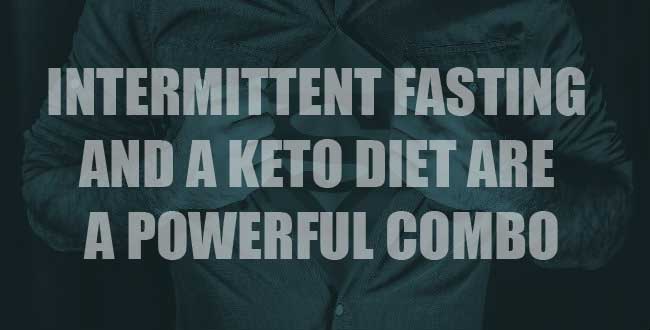
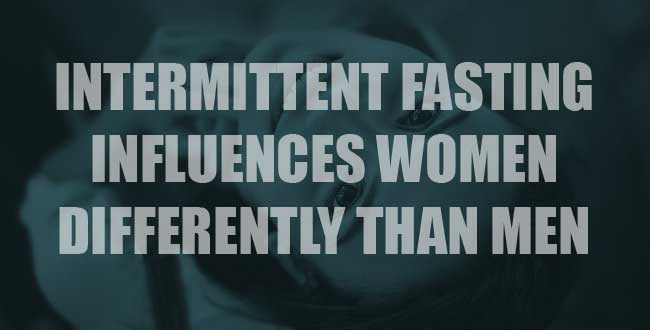
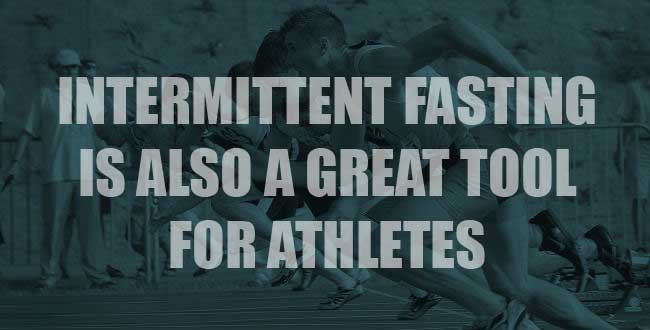
 Intermittent Fasting Tips… You Cannot Miss
Intermittent Fasting Tips… You Cannot Miss











